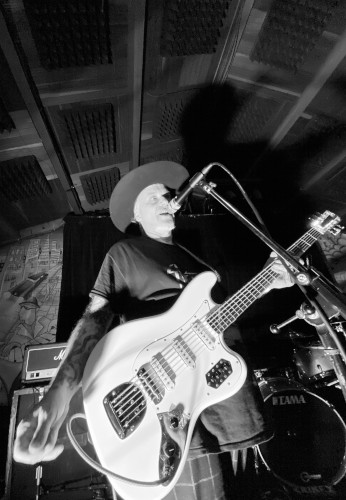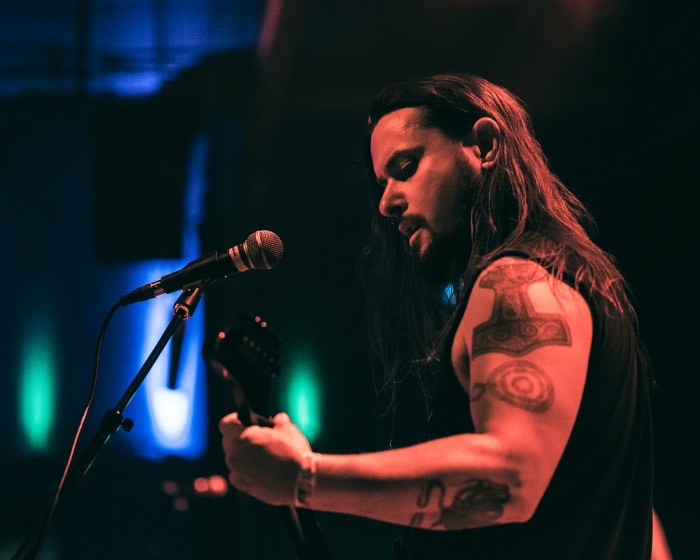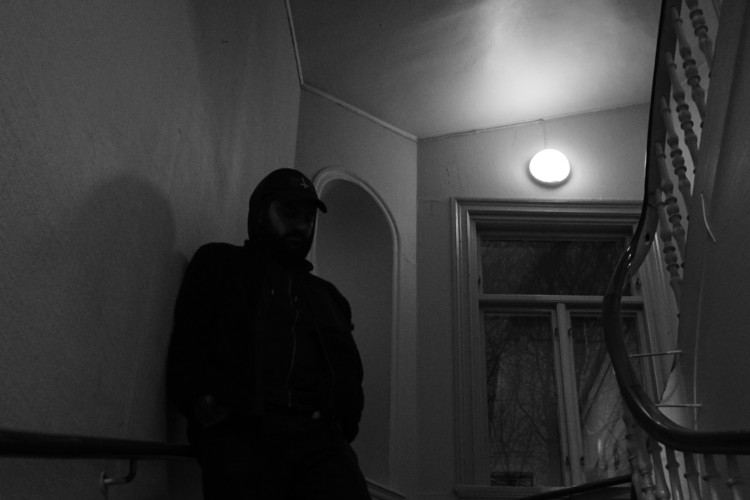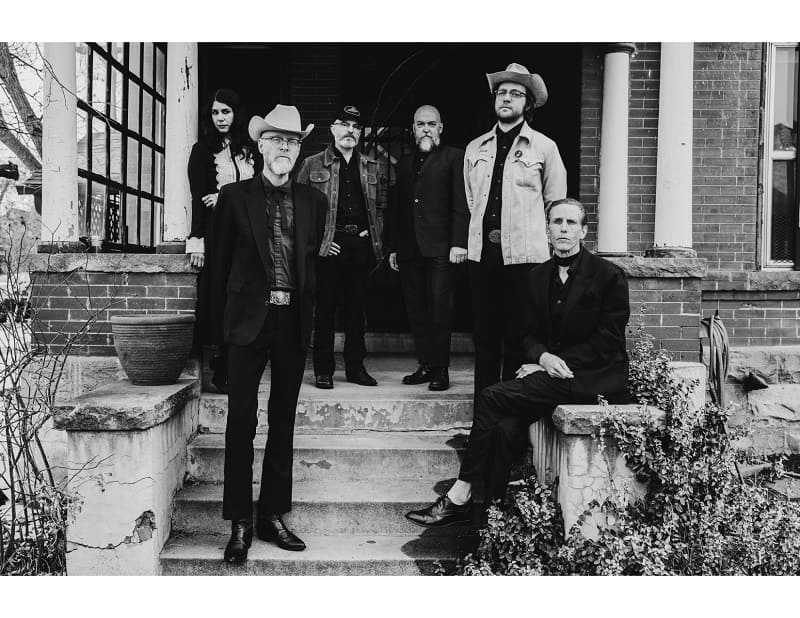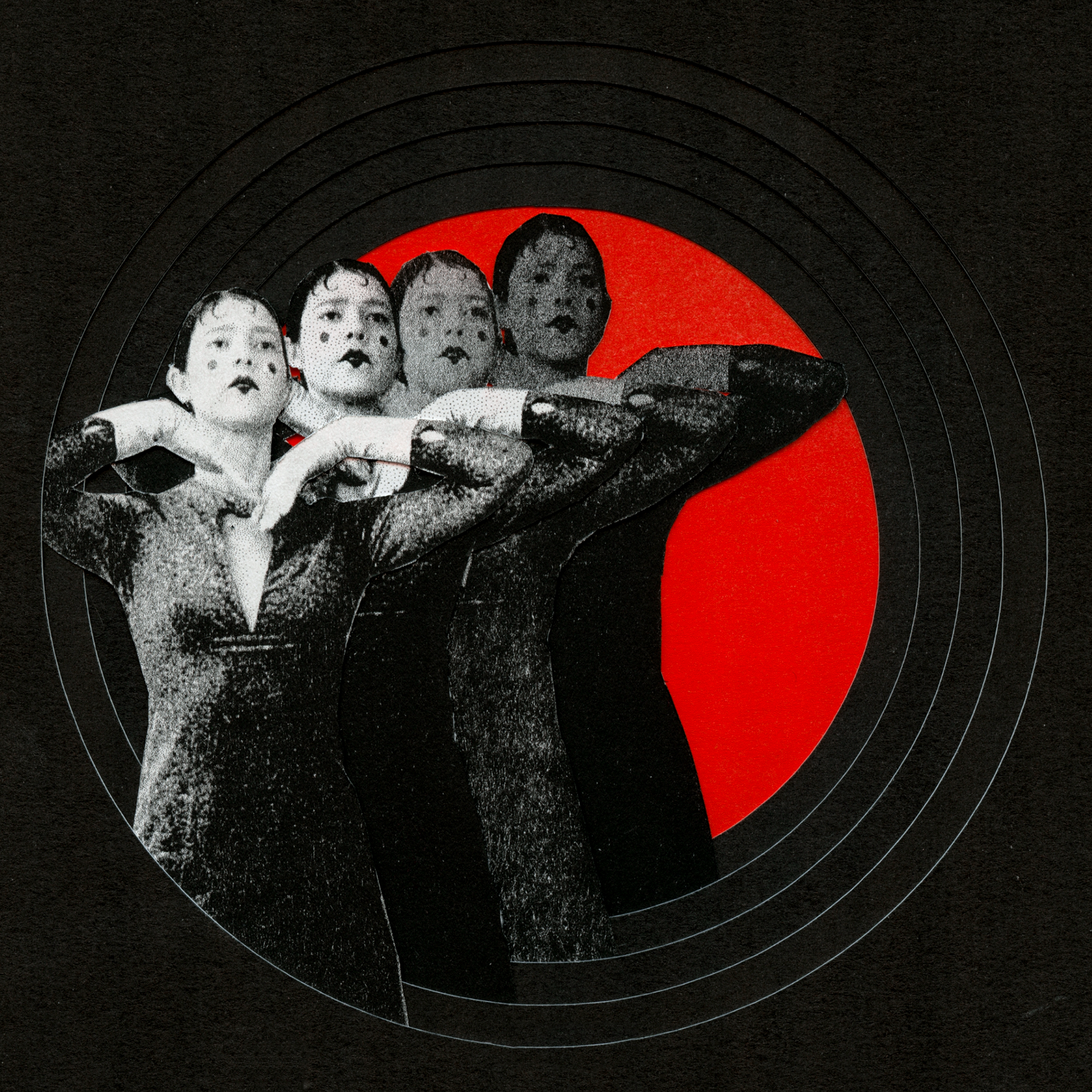Interviews
If you are one of those nerds who wants to know more about a band or an artist than just their records, then our interviews are right your thing! We feature an interview every week by a different artist and from a different genre. Every once in a while we also feature a lengthy interview with a musical hero from the past. Furthermore you can also find some shorter interviews we did for our specials here! And now - enjoy and read, what some amazing artists have to say!
-
Interview with KOLLAPS\E
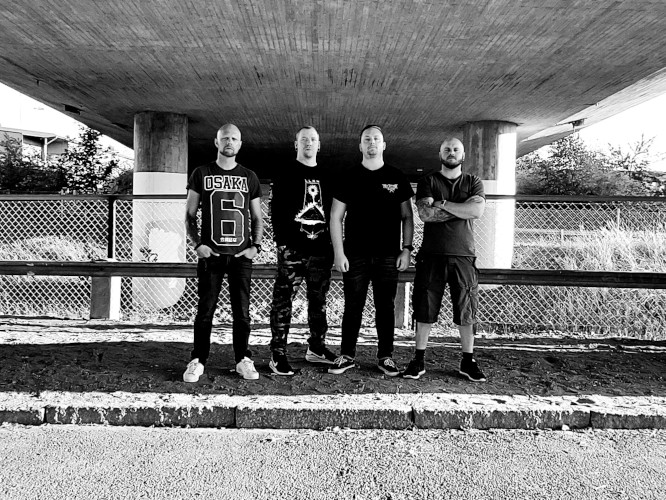 08 Mar 2023 - Thorsten
08 Mar 2023 - Thorsten
Sometimes it is awesome to help friends. When being a music blog that’s not always easy, because how do you tell someone you like “I think we cannot help you, because the record is not good (at all)”? Difficult and sometimes awkward. In the case of KOLLAPS\E, the constellation of musician - reviewer is an easy one, because the band is constantly evolving and their latest record The Phantom Centre is an awesome piece of Post-Metal, full of heavy songs, brilliant dynamics and loads of atmosphere! Therefore we had to sit down with Daniel, the mastermind behind the band and talk about the band’s development, the songs, the pandemic and so much more. Enjoy!
Continue reading > -
Interview with Mike Haliechuk (Fucked Up)
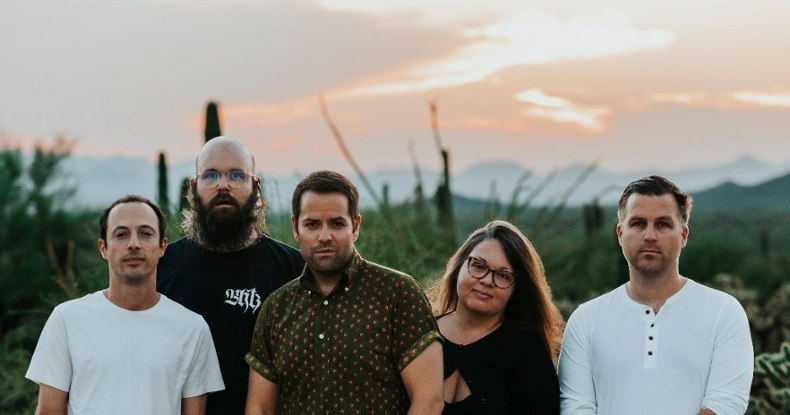 05 Mar 2023 - Thorsten
05 Mar 2023 - Thorsten
There are bands who make a record every two years and others publish one full-length a year. There are more productive bands and there is Fucked Up, a band with more than 100 releases to their name. One guy that was in it for all of these is founding member Mike Haliechuk who also writes most of the stuff - also for the latest record One Day, which shows yet another side of the Canadian Hardcore band!
Continue reading > -
Interview with Chef Curtis Duffy
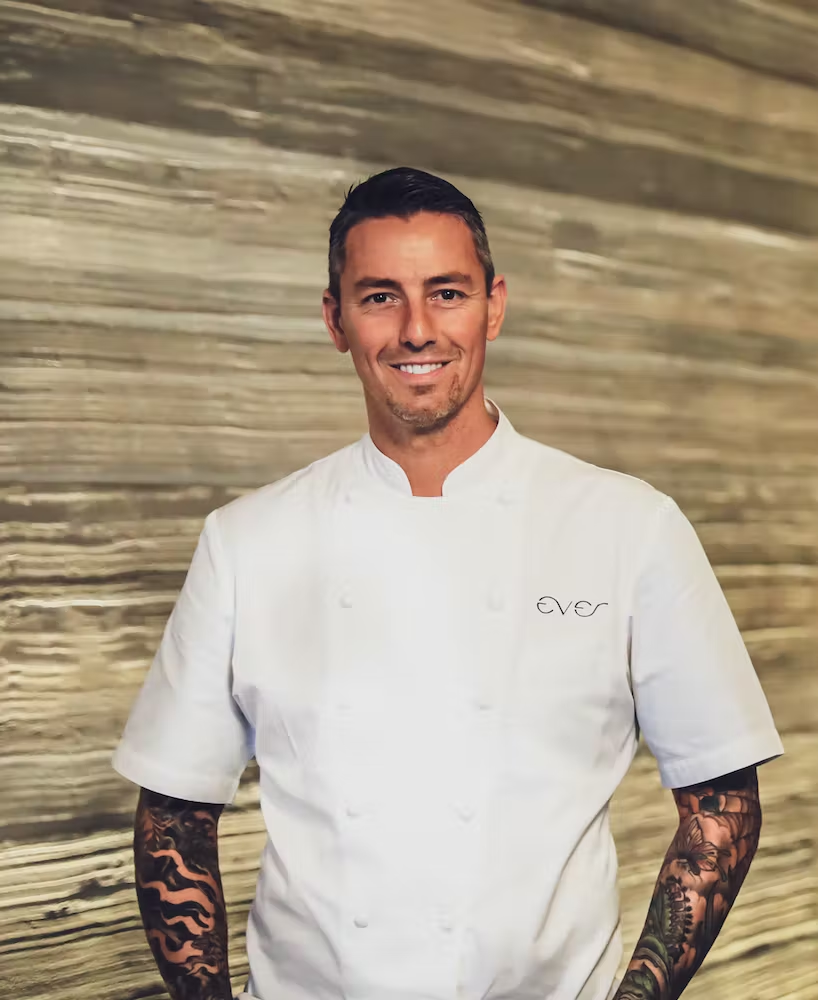 02 Mar 2023 - Thorsten
02 Mar 2023 - Thorsten
We here at Veil of Sound try to come up with new ideas for talks and topics all the time and sometimes we ourselves are surprised when some of these ideas work out. One of these surprises was this interview with Chef Curtis Duffy, one of the most interesting American chefs who turns out to be a metal head like many of us, who knows his stuff and who spent more than half an hour talking to Thorsten! Enjoy this delicious interview!
Continue reading > -
Interview with jeffk
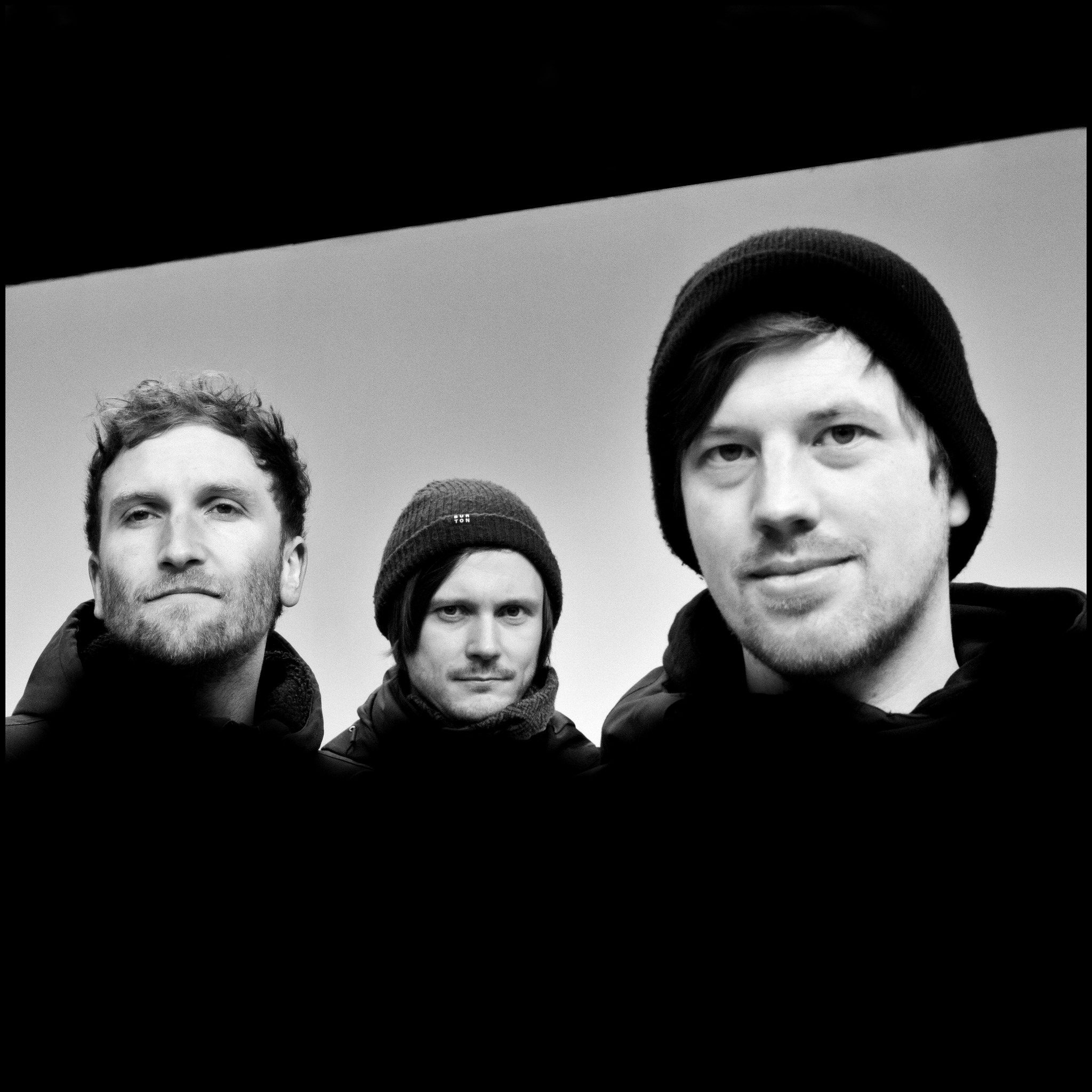 26 Feb 2023 - Thorsten
26 Feb 2023 - Thorsten
Post-Rock bands have a tendency to elongate songs into infinity by repeating parts over and over again - it can become boring at times. Therefore it is pretty refreshing to hear a band doing Post-Rock but without these redundancies - even though there are also a lot really good ones out there who write long songs that are not redundant. One of these bands for Post-Rock lovers with short attention spans is surely jeffk from Leipzig, Germany, who has recently released their new record TAR and who were so kind to sit down with us and talk about the record and so much more!
Continue reading > -
Interview with Constant Smiles
 19 Feb 2023 - Thorsten
19 Feb 2023 - Thorsten
Dichotomy. Paradox. Contrast. All words that synonymously could be used to talk about the difference between the Indie-poppy music on Constant Smiles’ new album Kenneth Anger which will be released at the beginning of March. Bundled up together with the circumstances revolving around charismatic frontman Ben Jones this record gave us the perfect opportunity to talk with him. Enjoy!
Continue reading > -
Interview with Kevin Rutmanis (The Cows, The Melvins, hepa.titus and more)
12 Feb 2023 - Thorsten
We could start the intro to this interview just like the last one (with Shelby Lermo) because today’s guest is about to do the very same thing - release two very different albums on the same day, on with his band hepa.titus and one with his project Dunn with Rutmanis. Veil of Sound of course took the opportunity to talk with Kevin Rutmanis.
Continue reading > -
Interview with Shelby Lermo (Ulthar)
05 Feb 2023 - Thorsten
Releasing one record is surely not enough, a double album might suffice most, but how about creating two records at the same time, releasing them on the same day and make people wonder how much (or little) sleep you got during the process? Ulthar did the latter and have released one of the early forerunners for Death Metal Record of the Year with their bundle Helionomicon and Anthronomicon - reason enough to sit down with Shelby Lermo!
Continue reading > -
Interview with Tristan Shone (Author & Punisher)
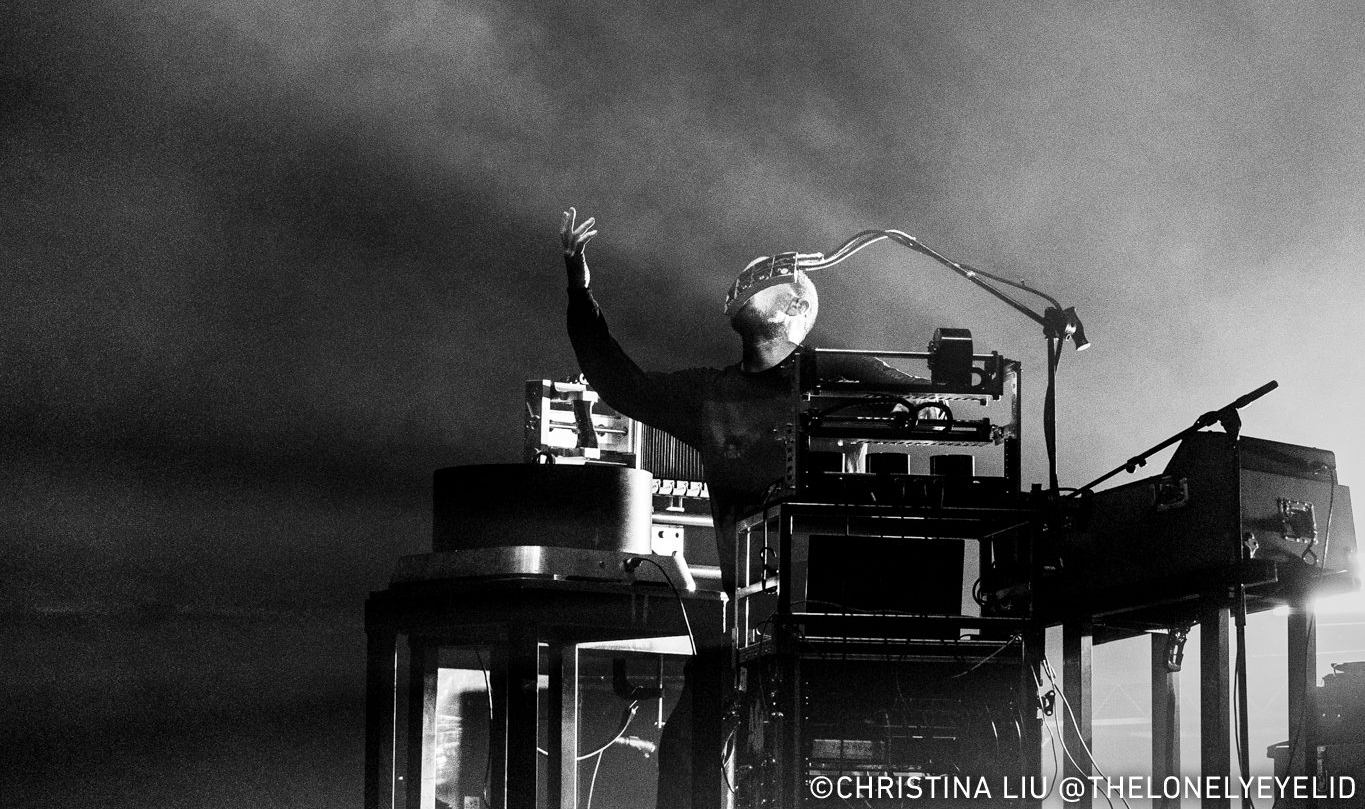 15 Jan 2023 - Thorsten
15 Jan 2023 - Thorsten
For decades, no centuries has mankind been dreaming of creating a symbiosis between man and machine - and music wise it might be said that no one has ever come as close to that symbiosis as Tristan Shone aka Author & Punisher. He has been developing machines for more than 15 years which enable him to create a sound that is industrial but man made, harsh yet melodic, shoegazey and metallic! And on his last album Krüller (check out our review of that miraculous record) he has taken another huge leap towards the sound that he himself envisioned years ago. And yes, that sound is addictive as one can see by looking at all the AOTY lists including Krüller!
Continue reading > -
Interview with Brutus x Psychonaut
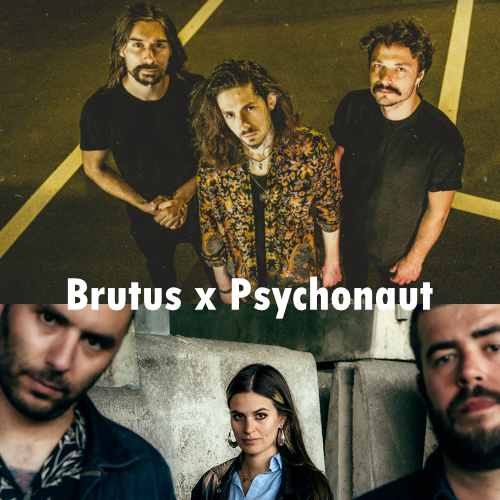 08 Jan 2023 - Thorsten
08 Jan 2023 - Thorsten
So we are pretty sure you enjoyed our interview marathon between XMas and New Years - if not check our YouTube Channel for those conversations with Jarboe, Sunflo’er, Dale Crover, drowse and Noah Landis (Tension Span)! nonetheless, that marathon is over, it’s a new year and we got a new format for you, which we will try to bring frequently but irregularly - two bands interviewing each other. And how awesome is this first edition with Brutus and Psychonaut?! Two Belgian bands who released mindblowing albums late last year and now we got them here on together on our channel!
Continue reading > -
Interview with Noah Landis (Tension Span, Neurosis, Christ on Parade and more)
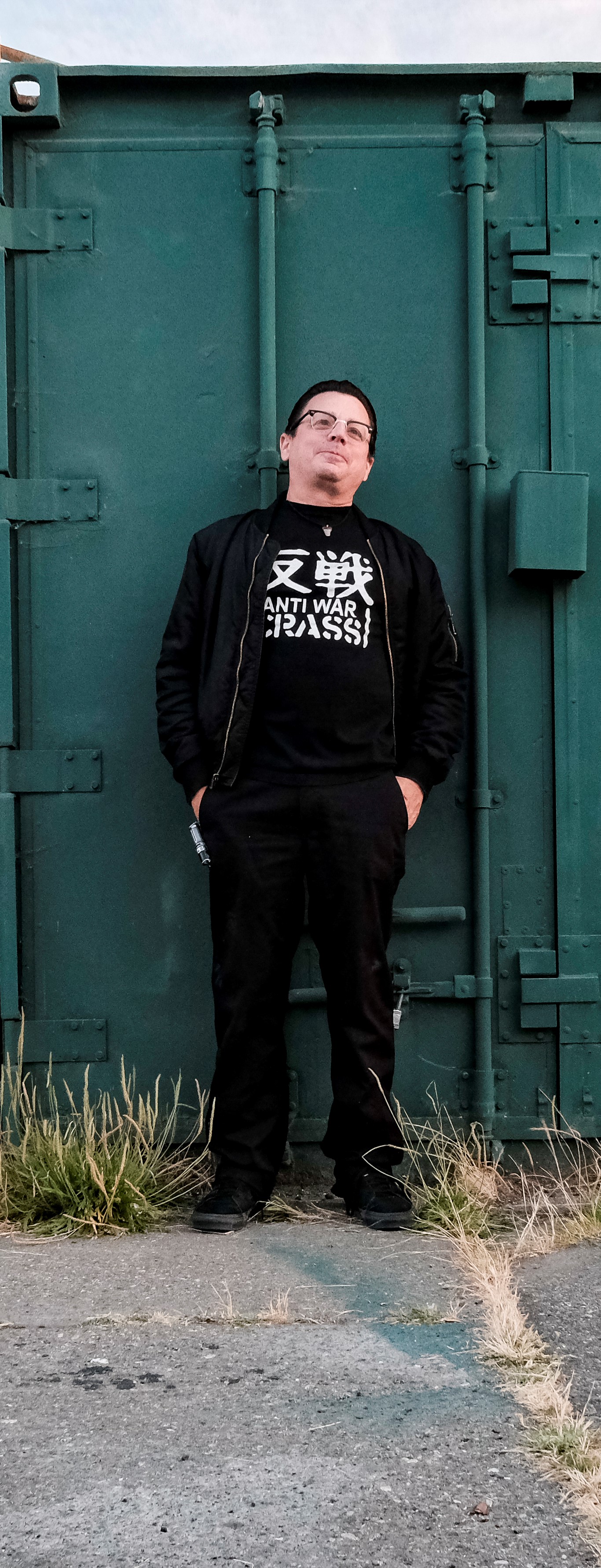 01 Jan 2023 - Thorsten
01 Jan 2023 - Thorsten
The first day of the year is always the final day of our interview marathon and just like last year we like to go out on a bang! And just like last year we want to end with an interview partner who would be much too humble to accept his importance: Noah Landis who played a huge part in the Gilman Street scene in the 80s, when bands like Samiam, Green Day and his most famous one - Neurosis - shared the stage very frequently. Noah has a new project, Tension Span, which we already reviewed here, and thus we had a lot to talk about!
Continue reading > -
Interview with Colin H Van Eeckhout on his home Flanders
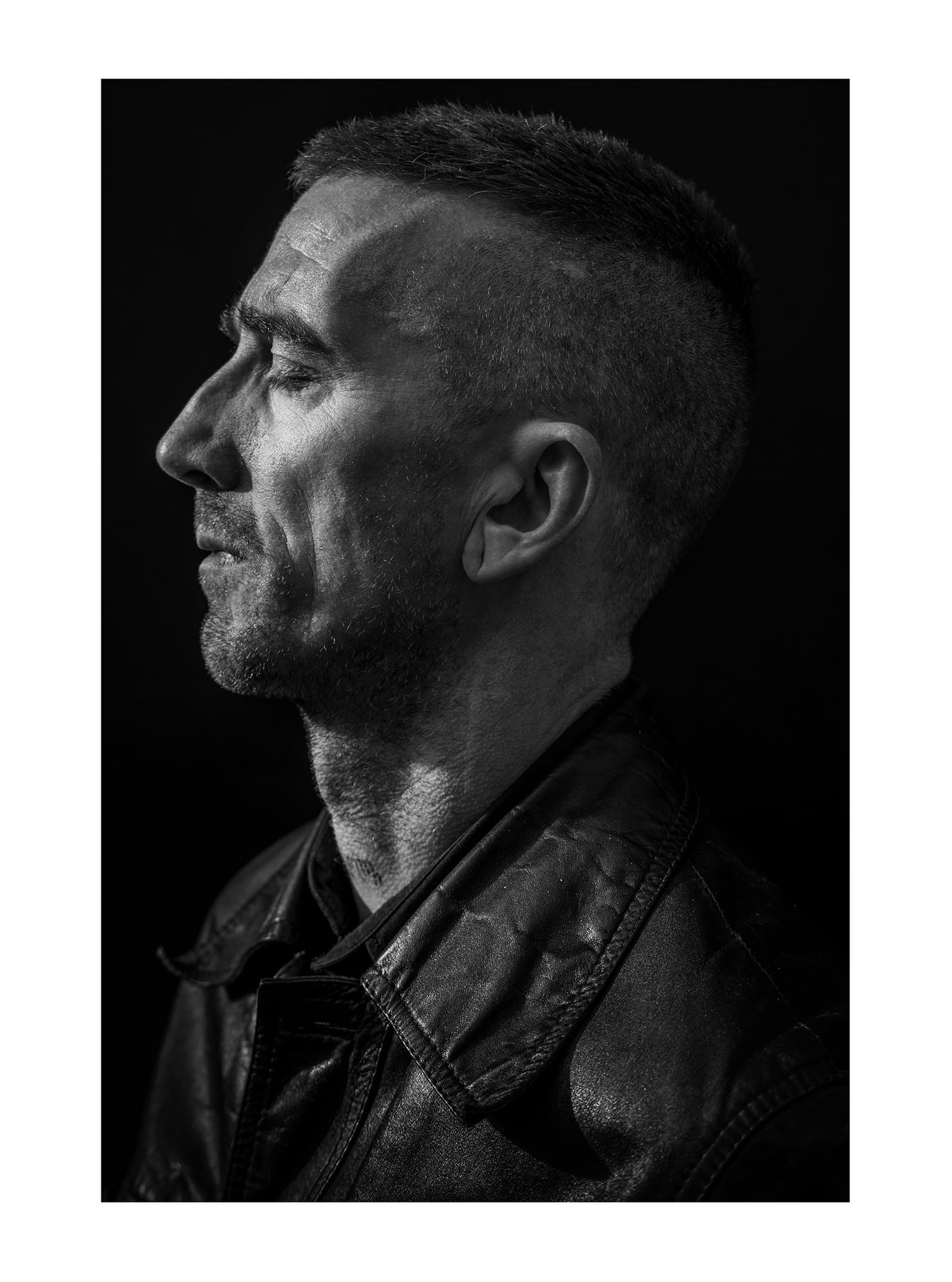 31 Dec 2022 - Thorsten
31 Dec 2022 - Thorsten
Day 8, you’re nearly there. And amid all the New Year’s festivities we want to throw another amazing interview your way to keep you busy. We already had the pleasure of interviewing Colin H van Eeckhout once this year (read the interview on his Absent in Body project here) and now he was so nice to spend some time wondering with us what it means to be Belgian or rather Flemish. We touch upon a lot of topics and he gives us some detailed information on his view of roots and why he doesn’t like separatism in his home country. Enjoy!
More or less exactly half a year ago, on July 1st, Simon Segers, Maarten Marchau, Thomas Hoste and CHVE released a really interesting record called De Manen Opzij (here you can find our review) via Consouling Sound (orders can still be made here) and while the record is really interesting in itself it also led me to ponder how a person like Colin would define his “Flemish-ness” or how being from Flanders has shaped him. And the ever-wonderful guy he is, he really gave us a lot of his spare time to talk about all of this, how the collaboration came to be and why a community center played a big part in it.
Do you yourself identify more as Belgian or more as Flemish?
Both really. Or even more. West Flemish first, then Flemish second, Belgian, European, Citizen of the World, Human… Depends on who you are talking to. It’s a means to put yourself in the Universe. Nothing more.
What does it mean for you to be Belgian? To be Flemish?
I have no idea. It’s such an abstract matter. I suppose it means I was born in Flanders, Belgium. And I grew up with the culture and morals that go with it, although that is already very diverse.
Which legends or traditions from your home region impressed you most, when you were a child/teenager?
None, I never saw anything happen that could be considered as a legend or tradition. I started reading about it later.
When thinking about Belgium and Flanders especially, I often come back to Flemish painters because there are so many awesome ones, van Eyck, the Bruegels, de Coninck, Bruegel, Rubens but also Magritte, Ensor, Tuymans, Panamarenko, Khnopff – why do you think has the country and region “produced” so many famous painters? How does this rich history of great visual art influence your work as an artist?
I have no idea. I would suppose that it started with the big harbors, and the world trade bringing a lot of colors and impressions back to this territory and the wealth here was able to stimulate arts as a meaning of installing their status. I am not schooled in art history so I would just express assumptions. No truths. It definitely inspired, we’re surrounded by tons of fine and contemporary art here in this little country.
Many cities like Ghent or Bruges feature some of the most splendid architecture which can be seen in a very ambiguous light as either very dark or as very bright – is that ambiguity also somethings that shapes Flemish culture?
I would assume so, even in the old Flemish painters colorful paintings there is a sense of darkness or at least that’s what I make of it. Medieval architecture has a robust nature, refined yet monolithic. It demands a respect of its viewer.
Musically, Belgium and Flanders has had and is having one of the most thriving scenes for several decades now – I know you and your bands have been a huge part of the H800 scene. Can you describe that time and how you experienced it?
I look back with melancholy. I praise myself lucky to have been a part of it. It came hand in hand with a skateboard scene. Everyone was full of positive energy and it just spread like wildfire. Even though here as well lyrics and themes were rather dark and smeared with teenage angst, there was a positive undertow. The vegetarian or vegan straight edge lifestyle got promoted among its ranks and was followed blindly. Like all teenagers we all wanted to be a part of something bigger. We wanted to identify ourselves. Put ourselves in the world. We started bands not being able to play any instrument, some persevered and are still around in some musical form. But it was the energy that made it spacial, the sense of community, togetherness. It was “us” against “them”. The DIY mentality got installed in that era, if you wanted something you needed to get it yourself, by going hard at it. Do it yourself, together with friends, be the best version of yourselves and work hard for it.
(Spineless was the root of Amenra back in the H800 days)
How can it be that such a “small” country has such a vivid scene? Does the government do something to support artists better than in other countries, e.g. Germany?
I doubt that.
I think the keyword here is the “small” in your question. The fact that we operate on a small scale, made sure that we all got to see “it” and each other. You very easily saw or heard about what was going on, and happening and you were able to connect with key figures very easily. It was very welcoming. And therefore very inspiring. So all helped each other out, instead of elbowing each other out of the way. Obviously the government supports the arts to a certain degree, but not really “our kind of art”.
But then you started Amenra and it changed again – I know you incorporate a love for many different Belgian artists like Zjef Vanuytsel. Which other Flemish artists influence your band’s work and your own?
Sculptors like Georges Minne, Constantin Meunier… the list is endless..but also contemporary artists like Berlinde de Bruyckere, Wim Vandekeybus, Peter Verhelst, Stephan Vanfleteren, Anne Demeulemeester.. Sculptors, writers, choreographers whatever.. there is some thing that that connects us all. Everyone shines its light on it from a different angle, and that automatically gives you another impression of “the thing” you work with.
Musically, I have to say the list is rather thin, people tend to step around the darkness, and aim for what is easily made more popular, more lighthearted, entertaining music.. Early Amatorski, Tamino or Ikraaan now, are things I resonate with.. I can’t say I dove headfirst into the kleinkunst artists, some writing is extremely deep, yet their over the top production sometimes killed it for me.
Flemish always sounds like a miraculous language to listen to, as it has a certain “rootsiness” to it, would you agree with that? Is sounds like a language well-connected to the soil where it comes from?
I would hope so, It’s something I always wonder about. When I ask foreign friends what we actualy sound like when speaking Flemish to one another. I had the theory of ‘sounding like Elves’ tossed in my face a couple of times, can’t say I got really warm of that idea :)
You use your mother tongue on several songs straying away from the regular English language – do you feel as if there are certain words that you can only express in Flemish? If so – is there a certain red thread running through these songs for you?
Yes definitely. For every expression or metaphor there is one language that takes home the grand prize. Something just make more sense, and sound deeper or more beautiful than another. You kinda have to hover from one another and feel how it translated to you.
But what that language is differs. It was extremely interesting to put focus on our mother tongue. Obviously your affinity and feel with your own language is way more elaborate or explored than any other. So I would assume you can go deeper with it, more layers, subliminal even. Saying more with the silence in between the words even sometimes. That’s a whole other story, the significance of silence in different times and forms.
When listening to your versions of Vanuytsel’s songs it becomes clear how melodic the Flemish language can be if used in a certain way – did you have to learn that for yourself?
I don’t really think it’s ‘more’ melodic that another. But in our culture you quickly forget about your own language. Often it was perceived as not being very credible on a larger scale. It sounded “dumb” on a superficial level. That because we here have been used to English or French being the more popular music. You automatically assume that stories need to be told that way. But if you start translating those lyrics, you quickly realize that sometimes they’re also drenched in banality, yet they do the trick. They get the story told.
Nowadays the region is known for a wonderfully diverse metal-scene as well – which newer bands should we check out that keep that free spirit alive?
I have no idea, I am very much oblivious to what is going on around me in heavy music. The last band that really drew my attention was Psychonaut. The Psychonaut off-spin Hippotraktor. Bands like Pothamus, Modder, Mother,.. they’re all worth checking out. We have a lot of new side projects getting formed. DOODSESKADER and PREDATORY VOID…but like I said. I am no reference.
How important were/are labels like Good Life, Funtime Records or nowadays Consouling Sounds and Hypertension Records for the development of the scene?
Very. The most important role.
Let’s talk about the historical character of the region – Belgium is a country that had to fight twice for its independence – once against the Spanish/Austrians and then against the Dutch. Do you see certain traits in your country fellowmen that come from those fights?
I don’t know. People that are deprived or that are being kept under the thumb will tend to fight harder for what they think they are entitled to. That’s probably what happened with this small country.
Can you understand secessionist views that want to separate Flanders & Wallonia?
No. I love the Belgian national “slogan” or “motto” or whatever its called: Eendracht maakt macht / l’Union fait la forçe - Strength through Unity
Now let’s come to your latest work “De Manen Opzij”, a real display of Flemish artists! Can you tell us something about the record title and the vocals that you brought to the table?
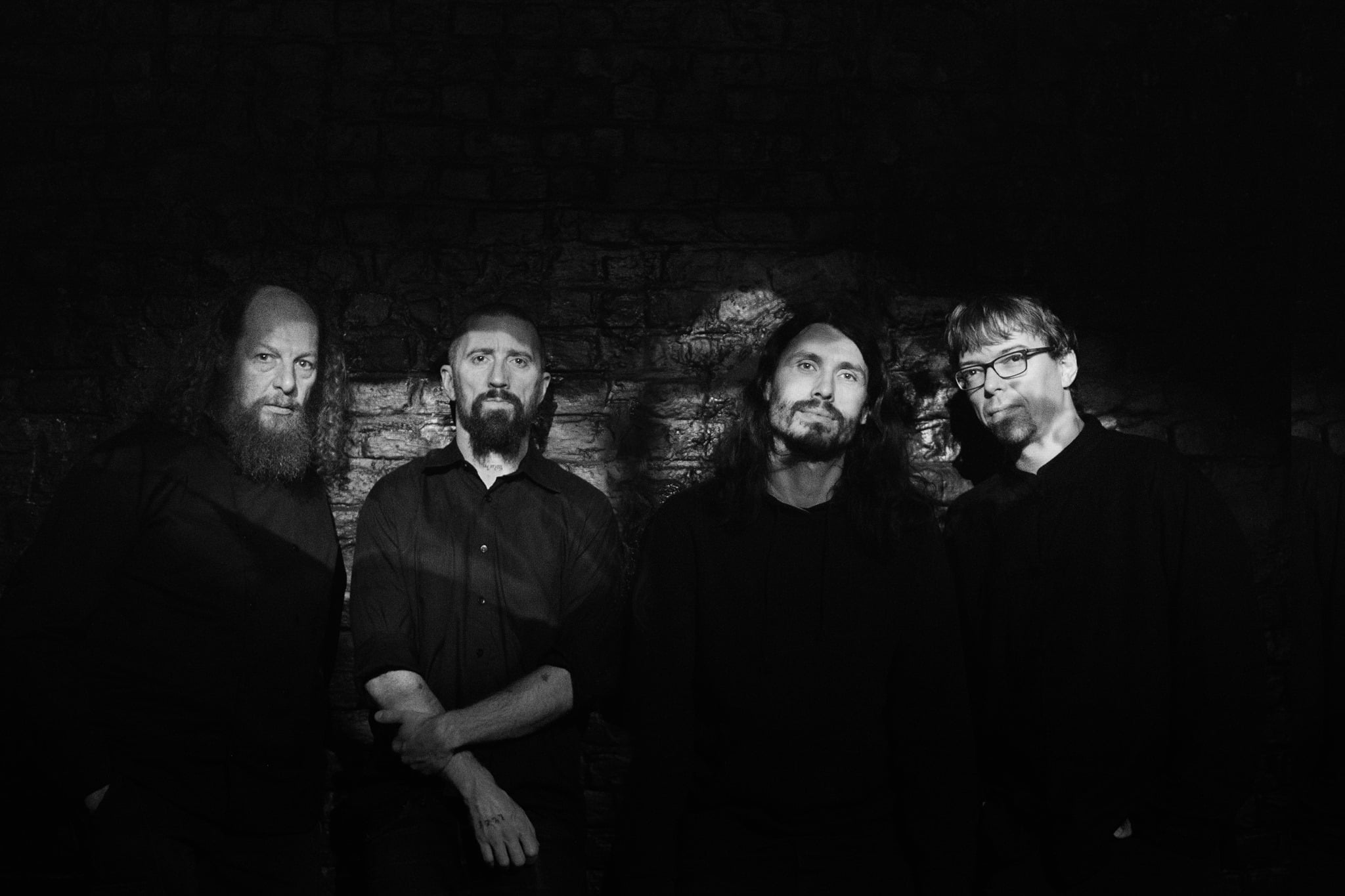
De manen opzij holds a reference to the theme that was the underlying start of the project. It was an old saga Paerdje Maleghys of our are. What in short was a tale told to keep the youth at bay, restrain them of excess. Like most tales legends or fairy tales were old means to install morals amongst its people.
Manes aside reference the manes of a horse, but in Flemish it has added poetic value, as it also means, “The moons aside”. Like you would be able to push the moon away, disregard the Light in the Darkness. I wrote a poem in flemish to hold that thought. I will not even attempt to translate it.
How did the collaboration happen?
It was Steven Reynaert, director of folkcentre Dranouter whom was so kind to bring us together. He had this idea to bring traditional folk musicians and more contemporary musicians together and see what would come from that. So you have Maarten Marcheau on traverso, mouthharp and bagpipes, Thomas Hoste an hurdy gurdy, Simon Segers is a jazz drummer and percussionist, and I was doing bass guitar, hurdy gurdy, percussion and vocals.
You had a residency at a music center for some time to write the record, is that correct? How important was that residency?
Defining for the project. I loved it. It made me grow as a musician, working with those talented people challenged me as a non schooled artist to find my place in there. Make my presence “valuable” as well.
Is the free spirit that is on full display on this record something uniquely Flemish?
All music is universal. Once in the airwaves it belongs to everyone. The spirit runs freely.
(Photo Credit: CHVE picture by Guy Kokken)
Continue reading > -
Interview with drowse
 30 Dec 2022 - Thorsten
30 Dec 2022 - Thorsten
We’re now on day 7 of our Veil of Sound Xmas-Interview-Marathon and today we present to you lucky readers a conversation with Kyle Bates, the mastermind behind drowse, who released his latest album, the excellent ‘Wane Into It’, through The Flenser in November (available on vinyl here).
Coincidentally this exquisite release was reviewed by us and featured in at least one of our contributing writers top 10 albums of the year lists.
‘Wane Into It’ is an absorbing, multi-layered exercise in the concept of memory that benefits from multiple listens to fully appreciate its beauty, preferably on headphones. If exceptionally well made lo-fi/shoegaze/slowcore is your thing, check the interview out and then delve into the drowse back catalogue.
Continue reading > -
Interview with Walk Through Fire
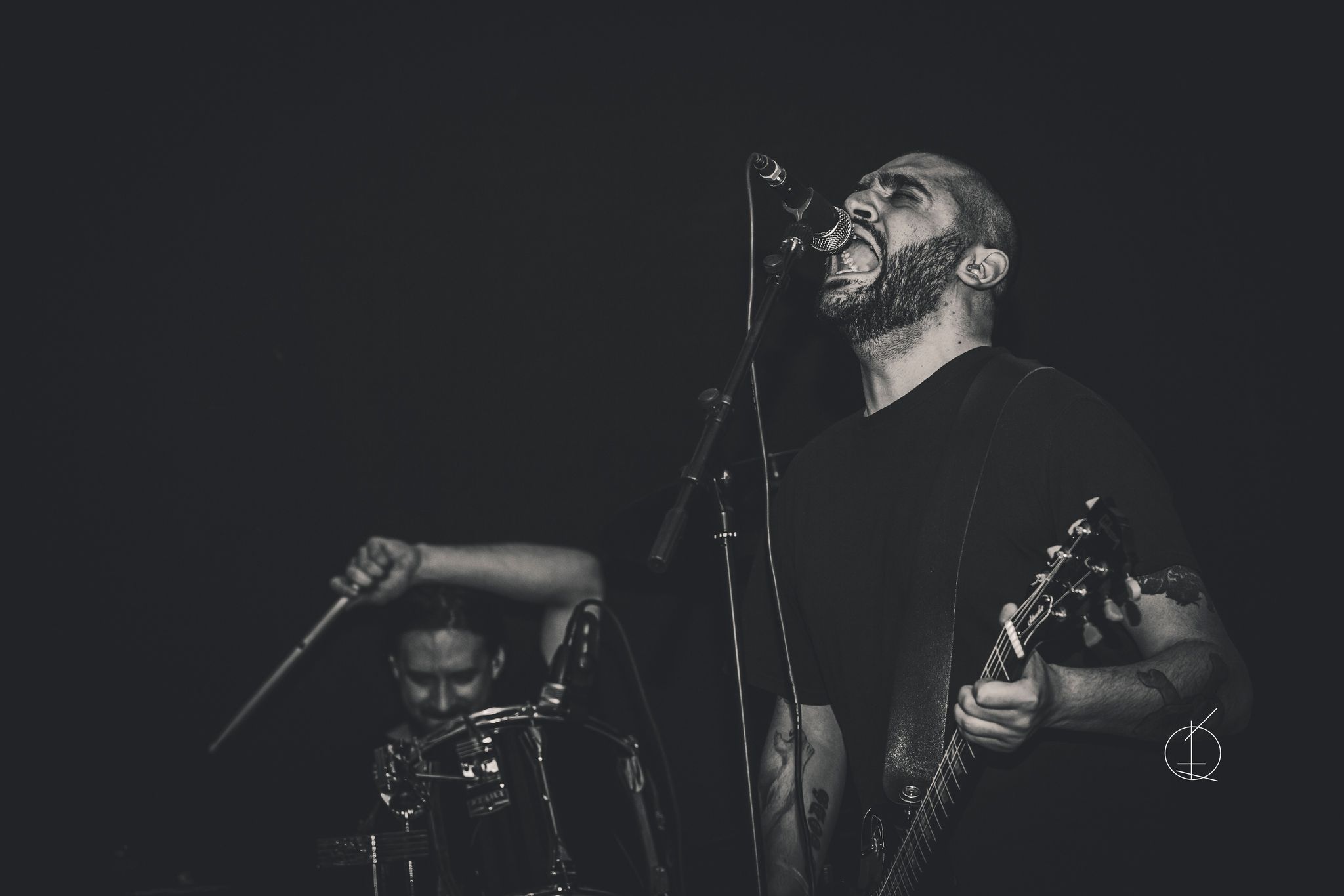 29 Dec 2022 - Thorsten
29 Dec 2022 - Thorsten
The sixth day has come upon us and with us we want to give you an interview with a slow Sludge or fast Funeral Doom band from Sweden: Walk Through Fire. They are currently working on a new record and also give us a few little hints at what we can expect from the new record. So, if you want to know more about their roots, their name, their songwriting process and why they are not a jam band at all - this one is for you!
Walk Through Fire’s Ufuk talks about his Turkish roots, the way it is connected to one of their artworks and so much more. This interview surely is so interesting and detailed so that the picture one might have of the band is not as rounded off as possible. All pieces come together for me, and I am very happy to give you this interview with Walk Through Fire, enjoy!
Now, your last record was released nearly three years ago now – and the records before were released after a three-year interval. When in 2023 can we listen to new Walk Through Fire-material?
Hello and thanks for reaching out. Yes, we do have a new album recorded. At this point we’re looking for a new label to work with, so it’s still a bit uncertain as to when it will be released. But we hope it will be soon!
What can we expect from the new material?
It’s a slow, oppressive dirge from start to finish. A natural continuation from Vår Avgrund I’d say. The organ is very central. Maybe even more so than on its predecessor. It’s also our first album with Esaias playing the organ. He’s a very talented musician and an absolute pleasure to be around and make music with.
By the way, Am I right in assuming that the same artist did the covers for your last two records? Will it be the same one on the next WTF record as well?
We have used different artists for each album cover. Our close friend and long-time fan Göran Nilsson (HYDRA GRAFISK DESIGN) did the artwork for Vår Avgrund and for some merch before that. For Hope Is Misery we used works by Turkish artist Cihat Aral depicting his experience being tortured in Turkish prisons in the eighties (same as my father and many of my relatives had experienced). The Furthest From Heaven artwork was made by me. For the next album you’ll have to wait and see!
Has Covid19 played a bigger role for you as a band or has the pandemic influenced your approach to songwriting?
It had both a negative and a positive impact on us. The negative side was that we released Vår Avgrund just a month before the lockdowns. This of course meant we couldn’t tour and promote the album properly. The positive side was that we used the time to refocus and write music for the new album.
How must we in general imagine the songwriting process for Walk Through Fire – is it jam-based or clearly structured? Who brings in what? Is it a democratic process or is there a main songwriter?
We barely jam. We actually suck at jamming. It’s usually me or Juliusz bringing an idea — either on the guitar or the organ — and showing everyone how we imagine it sounds like. Then we start playing it together until we find the right tempo and feeling, and then record it. After a while we start putting those pieces together into songs. Sometimes it takes years for an idea to find its place in a song. For instance, on the new album we have a part that was written back in 2015. We always loved it but didn’t find its right place until now.
Your name – Walk Through Fire – is it a reference to an album by Peter Gabriel (or Raven for that matter) or is it the idea of walking over hot coals that “incited” your choice?
No, the name came to me during a period when I was watching Twin Peaks and was into Charles Bukowski a lot. Twin Peaks has the sentence “fire walk with me” as a theme throughout the series, and Bukowski has a book called What Matters Most Is How Well You Walk Through The Fire. Both resonated well with how I imagined the music back then and what the band should be about.
Your sound is pretty unique for even though it is obviously doomy sludge or sludgey doom (whichever box one might prefer) but at the same time it’s pretty shifty and diverse. How much thought do you give that aspect of the music?
I think that comes from us trying to make music that we want to listen to ourselves — but to our knowledge doesn’t exist yet. We want to push the boundaries and explore the unexplored. For instance, we often experiment with playing a composition absurdly slow or overly repetitive. In that absurdity sometimes something unique and beautiful grows.
It seems as if slowing down the songs is important for you, but you never fall on for the droney side of doom – are you careful not to use such sounds?
We put a lot of thought and effort into our sound. Ever since Hope Is Misery (from 2014) we’ve barely made any changes to our gear. We’ve always been very strict on not applying any effects apart from distortion. A lot of metal bands rely too much on reverbs, compressors, delays and other effects to make it sound big and dramatic. It can easily feel like unnecessary cosmetics. We like it raw and simple.

On the last record you seemed to use your mother tongue for the first time – what sparked the change?
We wanted to break down as many barriers we could between the music and the human emotions it represents. And one of those barriers for me was the English language. It wasn’t the language of my thoughts, or “inner voice” (the voice we use to understand those emotions intellectually). It was very frightening at first. I felt great discomfort because I had never heard this type of extreme slow music with lyrics in Swedish before. But after a while I finally found my voice; how I was going to scream my guts out and articulate in a way that made it feel right. In the end I’m glad I exposed myself to that discomfort because ultimately it really elevated our music.
When you started the band more than 15 years ago – what was the intention behind it? To make that kind of extreme metal music? Were there any bands that inspired you for that sound?
To make music that dealt with personal and collective pain. Musically we wanted to do something that combined the melancholy of black metal bands such as DEATHSPELL OMEGA or early DARKTHRONE, with the slow punishing rhythms of doom and sludge acts such as CORRUPTED or GRIEF. On the first demo we were also very much into GODSPEED YOU! BLACK EMPEROR. But more than any other band, it was the Swedish sludge/doom band ABANDON that inspired us.
A few years ago you released a live album on which you played songs by Arvo Pärt – how did that come to happen? Why Pärt?
I saw this video for Pärt’s “Silouan’s Song” and was totally captivated by the slow, beautiful movements in both the music and footage. After watching it a couple of times I started imagining how it would sound through the wall of sound and heavy hitting slow rhythms of WALK THROUGH FIRE. It seemed like such a perfect match. One day we started trying it out at rehearsals by ear and instantly felt like this was something we needed to do. So, we put together a couple of pieces we wanted to play, adapted the instrumentation to our setup, and Juliusz even adapted the score to work for each person’s music reading skills since most of us had none. It was actually quite phenomenal what he did. After two years of rehearsals, we did one live show, which was recorded and released digitally as a live album.
When listening to your music more carefully it feels as if there is a deeper connection to the work of Pärt, which is also about space and time between notes or chords – would you say that Sludge or Doom lends itself perfectly to such interpretations?
I absolutely would. One perfect example is the SUNNO))) album Kannon. My guess is it’s based on one of Pärt’s works (which we also did on the live album): “Kanon Pokajanen: Ikos”. Listen and you’ll hear what I mean!
Is there any other modern composer for which you would do a similar record? I thought of Philipp Glass played by WTF? Would you also be open to step into completely different genres? Like Bitches Brew by Miles Davis?
Great question. We love Miles Davis, but I don’t think it would make sense for us to play his music. And while I’m personally not that into Glass, we have absolutely been inspired by Terry Riley and Steve Reich, and also by other types of composers such as William Basinski and Richard D James (APHEX TWIN). We actually did a rehearsal demo where we played “#3” from the Selected Ambient Works Vol. 2 by APHEX TWIN. An absolute masterpiece which worked perfectly with our sound. We have also recorded demos with interpretations of traditional Turkish music (which is where I’m originally from). But after Pärt we felt like we needed to focus on our own music. But who knows what the future might bring…
I ask that because there is a saxophone on your last record – is that something that drives you? To find out how far you can take the soundscapes? Which unusual elements can you incorporate?
Those ideas have come very organically I’d say. It feels pretty easy for us to explore new sound territories within our music because we don’t have that much to compare ourselves with. I don’t know any band that sounds quite like us and that’s a great freedom that allows us to take inspiration from a wide variety of genres.
Who played the saxophone parts on Vår Avgrund?
Malin Wättring, a very talented impro saxophonist.
What do you then think of bands like A-Sun Amissa or Rivers of Nihil who also use saxophones?
To be honest, I have never heard those two bands. But one band that definitely inspired us to try the saxophone was one of our favorite bands: BOHREN UND DER CLUB OF GORE.
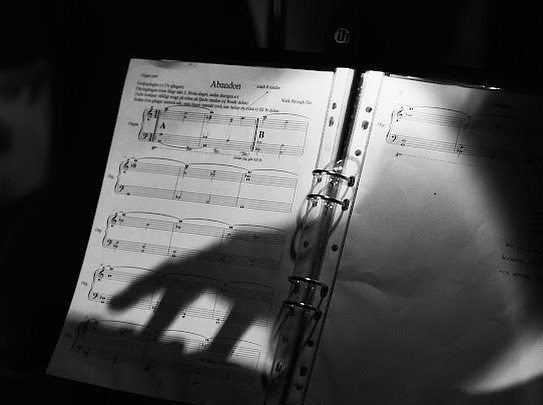
Is there any surprise in that sense on the new record that you might give us a little hint at?
I don’t think anyone that has listened to us before will be surprised. They will hopefully just be glad we’re doing our thing again but even better. And anyone who listens to us for the first time will probably be surprised in either a good way or a bad way. It’s usually the case.
If you could do a split covers record with any band around at the moment and each band covers two songs by the other one – which band would you choose to cover which of your tracks, and which tracks by that band would you like to cover in return?
I think contrasts would be interesting. So, I’d like to begin somewhere far away from how we sound, but with some crucial elements in common with us. The contrasting elements could be slow vs fast or hard vs soft. A crucial element could be tonality or the melancholy in our music. So, let’s say…
IMMOLATION. One of my all-time favorite bands.
We would cover
“Close To A World Below”
“I Feel Nothing”They would cover
“Den Uta Botten”
“Till Intet Gjord”But I guess I would have to give Ross Dolan the freedom to translate the lyrics into English, as I’d hope they’d give us the freedom to skip the guitar solos!
You can curate a one-day five/six-bands festival and WTF is also playing – which spot would you play in, and which four/five other bands do you invite to play? Which running order?
COUCH SLUT
WALK THROUGH FIRE
ORANSSI PAZUZU
JK FLESH
WILLIAM BASINSKYAnd now to our quickfire round:
Crowbar vs. Eyehategod? Both of them have had an influence on us but I’d go with EYEHATEGOD because of their uncompromising attitude and integrity they’ve kept all these years. And no other band can bend time in slow tempos like EHG.Down vs. Corrosion of Conformity? DOWN (I & II)
St Vitus vs. The Obsessed? ST VITUS
AC/DC vs. The Rolling Stones? AC/DC (Bon Scott years)
Turbonegro vs. Kvelertak? TURBONEGRO.
Breach vs. Refused? BREACH. One of the most unique, grooviest, and darkest metal/hardcore bands that have ever existed. They were a true force of nature.
The Doors vs. The Beach Boys? THE DOORS.
Touring vs. Writing/Recording? Writing and recording.
Beer vs. wine? Beer.
Roadburn vs. Psycho Las Vegas? Roadburn. The first year I attended Roadburn was in 2011. In one single weekend I saw TODAY IS THE DAY, SWANS, GODFLESH (Streetcleaner set!), WOVENHAND, EARTH, SUNN O))), KEIJI HAINO, WINTER, SCORN and CANDLEMASS… But lately their musical direction hasn’t been for me really. So, if I got the chance to go to Psycho Las Vegas I would. Their lineups remind me of the old Roadburn days.
The beach or the forest? A silent beach
SunnO))) vs. Boris? Coincidentally enough I was listening to their joint split Altars just now. Great record. But I would go with SUNNO))).
Thank you for taking the time and talking with us, all the best for the record release and we hope to see you soon.
Thank you, Thorsten! Likewise. /Ufuk
(Photo Credit: title picture: Erik Hermanby, sheet music picture: Einar Stabenfeldt)
Continue reading > -
Interview with Dale Crover (The Melvins, Nirvana and many more)
 28 Dec 2022 - Thorsten
28 Dec 2022 - Thorsten
Day 5, marathon midterm and today we touch royalty. Because today’s interview partner, Dale Crover, has worked with: Mike Patton. King Buzzo. Kurt Cobain. And these are just a few of the names he’s worked with. Starting out in the Pacific Northwest and leaving with King Buzzo from there right before Seattle exploded, he also left behind a band he used to play in you might know: Nirvana. But hey, being one of only two constant members of The Melvins ain’t so bad either, huh? We talked with him about the new Melvins record, the band itself, his relation to Buzz and so much more.
When talking to Dale, one does not have the feeling as if he is talking to somebody who was in so many bands and projects with so many famous people and musicians, artists and vocalists. Why? Because if there is one thing Dale certainly ain’t, it’s arrogant. He is a funny, regular guy when talking to you pretty openly about how the new record came to be, what it is like to be a part of the Melvins for so long, that he seemingly understands Buzz blindfoldedly and how it feels to be 69th best drummer in the world (according to a certain magazine, that doesn’t know anything)! Enjoy folks!
(Photo credit: Shervin Lainez)
Continue reading > -
Interview with GGGOLDDD
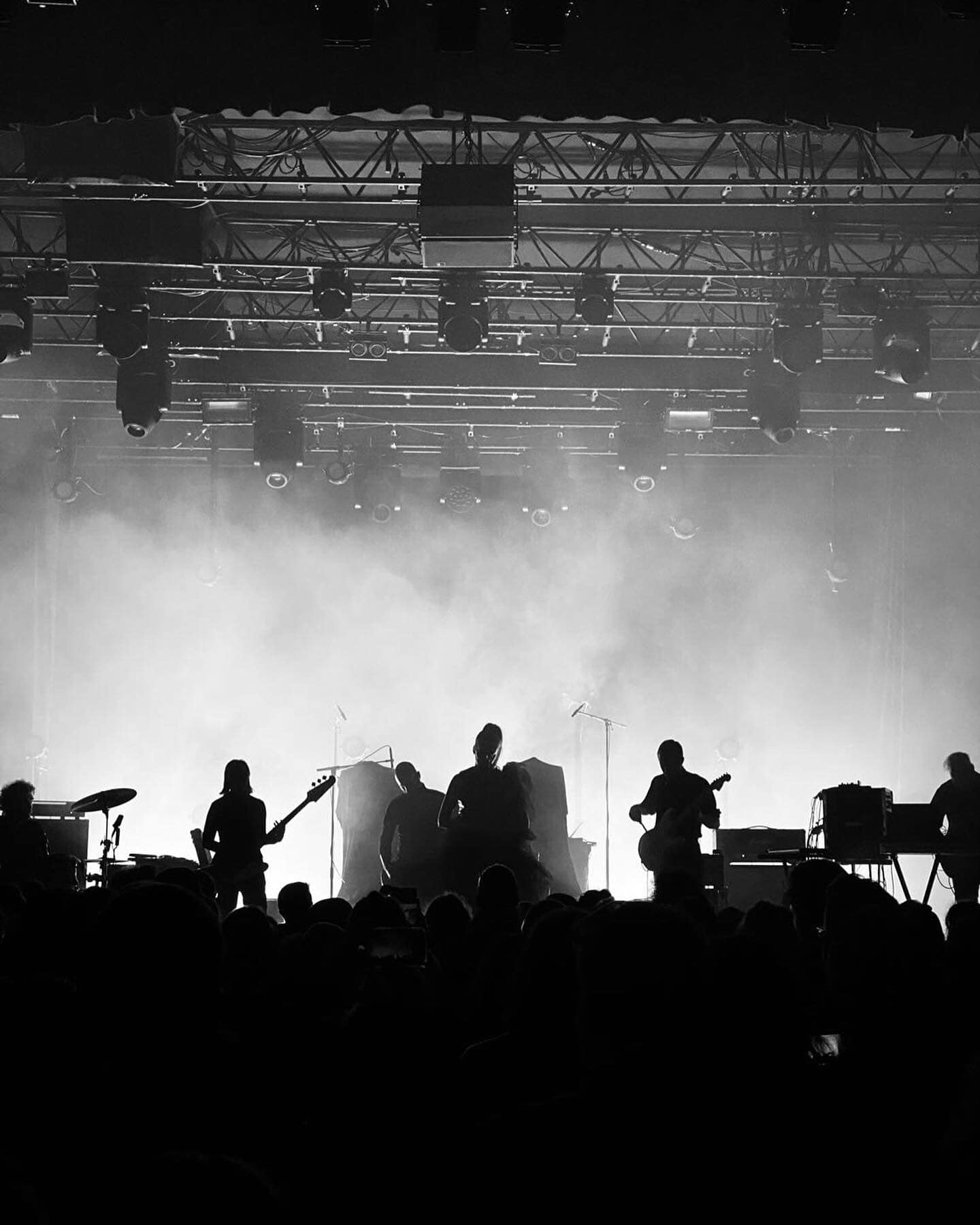 27 Dec 2022 - Stephan
27 Dec 2022 - Stephan
Nearly at mid-term in our interview-marathon and this time we got our second written interview – maybe a bit shorter than usual, but we guess you can use a little breather. Additionally we are 100% sure that you are gonna like this interview with GGGOLDDD, one of the most interesting bands around, whose masterminds Thomas and Milena also curated 2022’s edition of Roadburn and who came up with an album that needs to be talked about constantly.
This Shame Should not be Mine opens a lot of discussion about how to deal with sexual harassment and rape and how to deal with it, how to cope with it. Not only this is a topic for us, but of course also how the curation for and collaboration with Roadburn Festival went for the couple. You see - there is more than enough to talk about and thus we are more than happy to give you this interview which Stephan did for us. Enjoy!
First of all I want to congratulate you on what an outstanding album This Shame Should Not Be Mine has become, and on all the well-deserved attention and praise it receives!
On the album you (Milena) are singing about your personal experience of sexual assault in very real and clear words. And I think your focus on the trauma and its effects makes it accessible and relatable to an even wider audience beyond the already sadly too huge group of survivors and indirectly affected of this kind of violence. Did you receive any reactions from directions which have surprised you?Since we first performed This Shame Should Not Be Mine at Roadburn Redux we have received so many heartening and heartbreaking responses from people who can relate, all in their own individual way. A lot of them were also from men and non-binary people. Especially among men there seems to be even more of a taboo. And the taboo was a big part of why I wanted to make this album. The taboo is why people still feel isolated and guilty when this happens to them. So it’s important to tell these stories and help people understand they are not alone. And that the shame should not be theirs.
When talking about trauma and sexual assaults - do you think that we are witnessing the results of over-sexualized generations? Is this rise in publicly denounced sexual assaults a good sign in your opinion?
We are witnessing the results and collapse of patriarchy. Sexual violence is something of the ages. The fact that it’s now more talked about and discussed is simply because people feel empowered to speak out. It helps keeping the perpetrators and the power structures that used to shield them accountable for what they do.
I can imagine that there were many steps on the way which demanded overcoming: Realizing what the theme of the project would be, then discussing it within your band etc., each of those steps somehow getting bigger and bringing it out more into the open. Was this increasingly scary or did it eventually turn into a process of coping?
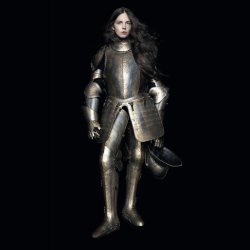
Both, I would say. It was scary addressing it publicly, even in the most intimate of settings. But it’s a necessary part of coping with it and finding a way of moving forward.
I saw you performing the full album at Roadburn Festival and I have seldom felt such a serious and respectful anticipation from all people on and off stage for a show of that size. During your performance especially “Spring” brought me as close to tears as it is possible without crying. Also considering that the album had started as a commissioned project for last year’s streaming edition of Roadburn, can you tell us how this show played out from your perspective?
It was definitely the most special show we ever played. The respect and attention we got from the crowd was very emotional for us too. We know that a show like this is rare for all in the room, so we’ll cherish this for a long long time.
Speaking of Roadburn, you (Milena and Thomas) were also invited as curators for the festival and put together an array of artists ranging from guitar dream pop over experimental electronic to sludge and black metal. How was that process and what were your takeaways from that experience?
It was such an honor and so much fun! We could just throw wild ideas at Walter and he would work with us to make some of these happen. We really feel like we managed to materialize the concept of “Redefining Heaviness” and are super happy with the acts that were booked. We also learned a lot about what it takes to put such a festival together and we got even more respect for everybody involved.
How did the people at Roadburn react when you told them of your plans for your commissioned piece?
If we remember correctly we told Walter what it was about and we sent him the first demos of what we had been working on. His response was very emotional and gave us a lot of confidence and strength. Overall, the way Walter has put his trust and confidence in us, has helped us a lot in finding our path forward.
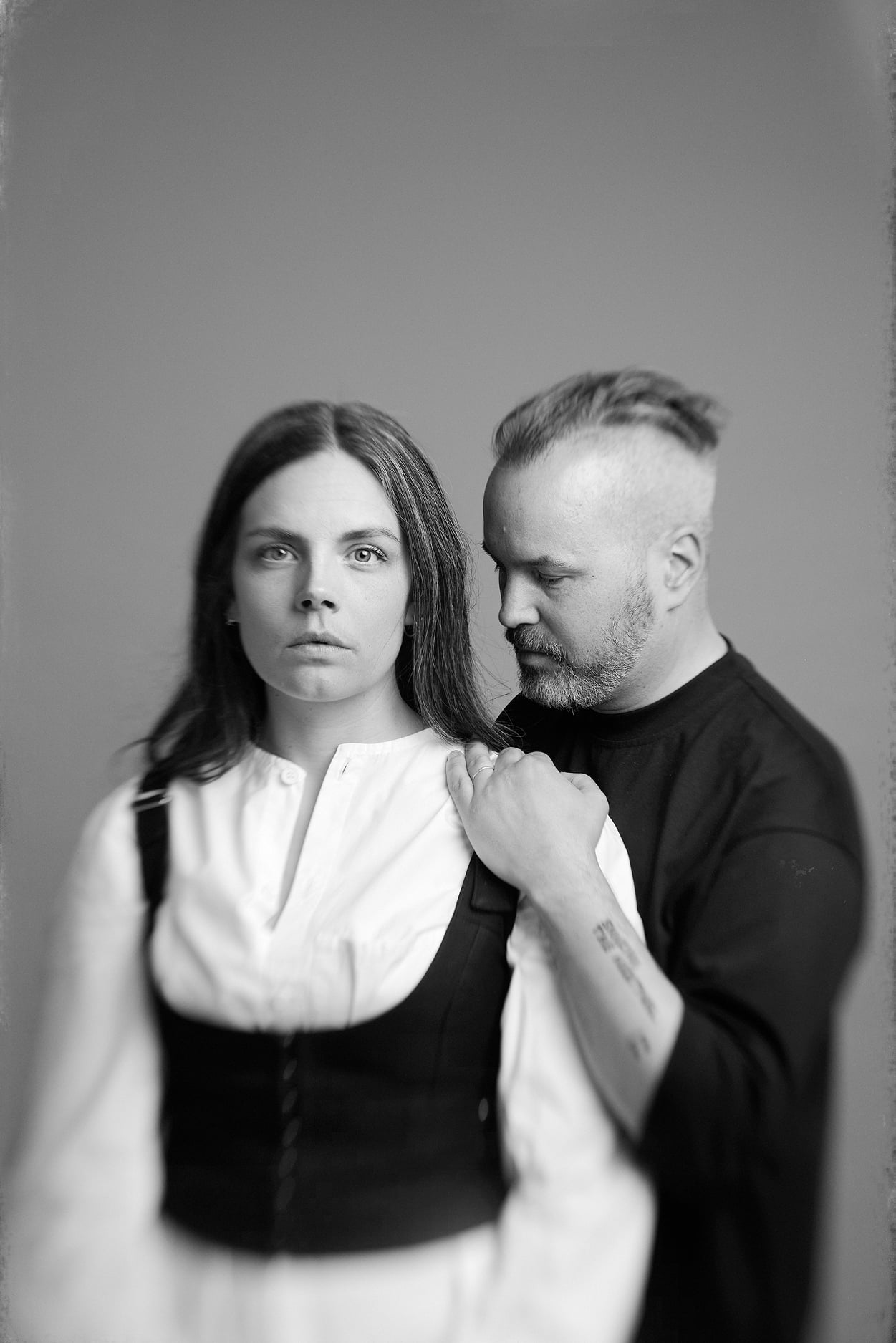
As a fellow attendee I just have to ask: Any favorite performances (inside or outside of your curation)?
This year’s Roadburn was such a special and emotional experience, with so many highlights. We were really blown away by the electronic acts, like Amnesia Scanner, Duma and The Bug. Liturgy’s performance of “Origin Of The Alimonies” really overwhelmed us. And Midwife gave such a beautiful concert.
Your interest in electronic music is also very much on display in form of the synths, minimalistic beats and trip hop influences on This Shame Should Not Be Mine. Do you think this would have happened as a natural progression of your style anyway or did this album in particular demand a different, less guitar-centric musical language?
It was something that we had wanted to do for quite a while. We had started to experiment with electronics a bit already, but the pandemic really forced us to dive deeper into this. Suddenly our band routine was totally gone as we weren’t allowed to get together. So we played around with electronics in our home studio and found a way to compose and arrange in that way. That came together with Roadburn commissioning a piece and the trauma rearing its ugly head. All of that together resulted in “This Shame Should Not Be Mine”.
Given the different setup on stage, will the recent material vanish from your setlists after the current tour cycle or do you consider translating some of the songs into “rock versions” later?
We’re always looking forward and you surely shouldn’t expect us to return to a more rock sound after this.
Finally let me address a concern many of your fans are probably worrying about: Are you always online? Your reaction time on social media usually is alarmingly quick!
Haha no
And speaking of internet matters: You’ve recently rebranded Gold to Gggolddd for mostly rather pragmatic reasons of better online recognition and optimized search engine results. Would you mark that as a success or has it led to further confusion?
We are super happy with it. It’s so much easier to find us online, and that is all we wanted to achieve.
Onto our infamous quickfire round - you get two alternatives, have to choose one and maybe give a short explanation. You also can answer separately.
Beer or Wine? NoFor your next vacation - the mountains or the seaside? Norwegian mountains please
More appealing to you - Paradise Lost in their electronic phase or in during their early Doom innovations? Icon!!
Writing/Recording or Touring? Writing
K’s Choice or Skunk Anansie? Skunk Anansie
Alanis Morrissette or Melissa Etheridge? Alanis Morissette
Portishead or Tricky? Portishead
Thou or Sons of A Wanted Man? Thou, because we have to admit we haven’t heard Sons of A Wanted Man, yet.
Iskandr or Fluisteraars? Fluisteraars
Messa or E-L-R? Both, but since they recently suffered a ravishing car crash, our hearts are with Messa.
(Photo Credit: Cover of TSSNBM: Szilveszter Mako; Thomas & Milena portrait plus live picture: William Lacalmontie)
Continue reading > -
Interview with Sunflo'er
 26 Dec 2022 - Thorsten
26 Dec 2022 - Thorsten
So, day three already. After the great and mighty Jarboe and Alcest, we now want to give some of you the chance to maybe discover a new band you might not have been giving attention by now: Sunflo’er from Potsdam in Upstate New York. Their latest album all these darlings and now me is bursting of energy and brimful with mighty, clever ideas and twists and turns that show a modern Hardcore band aiming for the sky. Enjoy our video-chat with the whole band!
I did not know too much about Sunflo’er before this interview and me preparing for it. But listening through their discography and especially their latest album, I was not surprised because the label through which the four guys are releasing their music usually never fails in their roster-choices: Dark Trail Records . And they do not disappoint this time around either. Sunflo’er has made a giant leap and maybe released the modern American Hardcore album of 2022 next to Soul Glo and The Callous Daoboys. Therefore we talk about the record and the songwriting process behind it, but also about Wes Craven and why one of them has a box of Corn Dogs in his fridge! Enjoy!
Continue reading > -
Interview with Neige (Alcest)
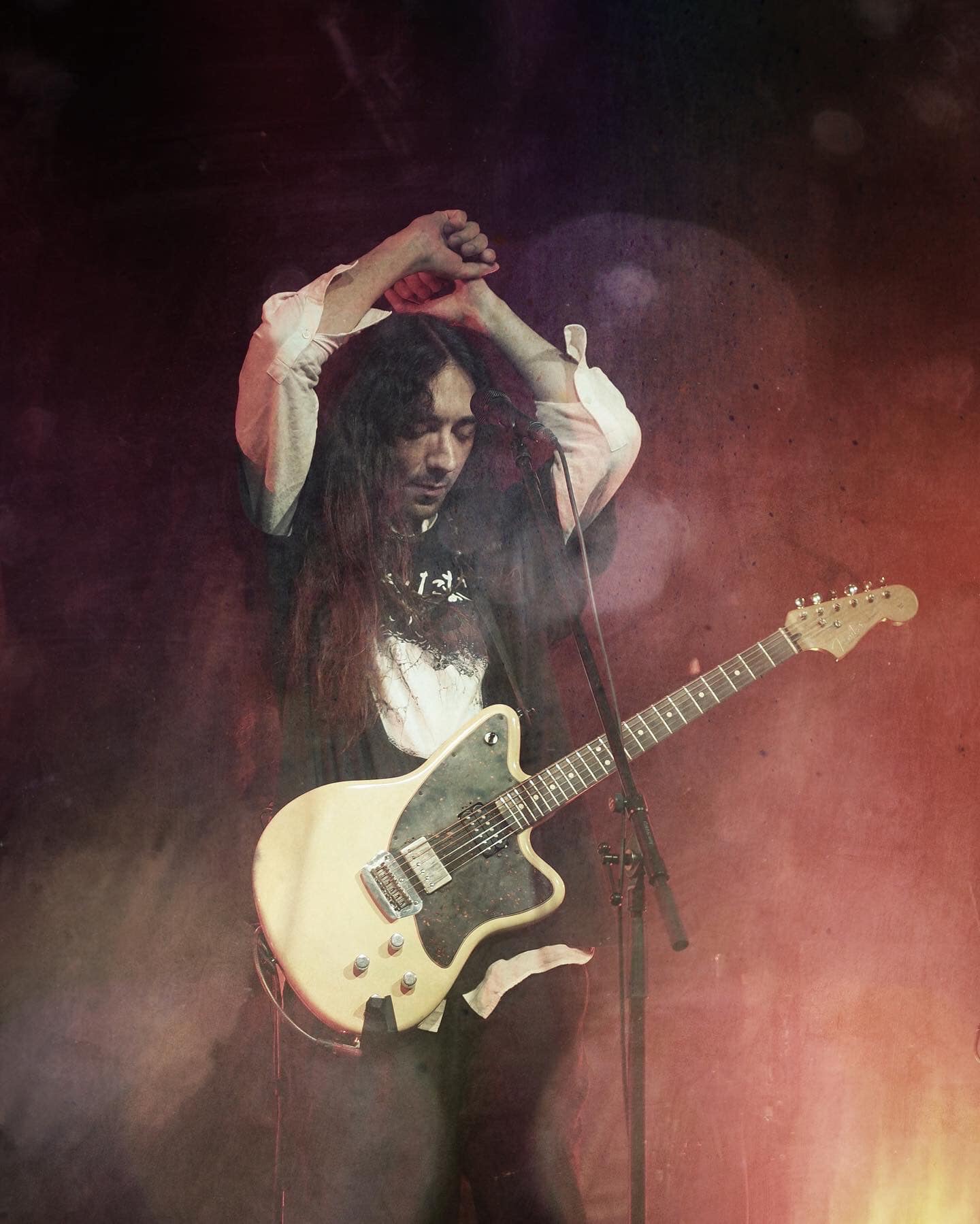 25 Dec 2022 - Thorsten
25 Dec 2022 - Thorsten
Day 2 of 9 – we hope you enjoyed yesterday‘s interview with Jarboe. Haven‘t listened to it yet? Well, don‘t worry, it‘s not gonna be taken down any time! Today we have a classic written interview with you and as you have already seen by the title of this page, it‘s with none other than Neige from Alcest! At first glance this might seem like a short interview but read carefully, there is a lot in it that might make you think or that you might not have known!
When people talk about Alcest, they often talk with admiring glances and with a lot of respect for the French band is regarded to be one of the pioneers for a sound that bands like Deafheaven or Heretoir took up. The band has been writing new material and we are happy to hear something about it and also about Neige’s approach to his music and life in general. Enjoy!
How do you cope with the dichotomy of being a completely normal person and at the same time being the face of a global phenomenon (at least in the metal world)?
It’s a difficult question. Well, I think speaking about the influence of Alcest as a phenomenon is probably a bit of an overstatement. This style of music is pretty underground and even if I am aware that a lot of bands were inspired by my work, which I am really grateful for, I never perceived it as something overwhelming or difficult to handle. Maybe I am a little bit naive / not aware of this influence but yeah I don’t think about it too much and rather focus on making the best possible music with my own project. I am extremely self-critical, and never really happy with what I create, so my musician life is like a never-ending quest for satisfaction. On the other hand, when someone comes to me saying that he/she formed a band after having heard Alcest, I take it as the biggest compliment possible, and as I said above, I feel extremely humbled and grateful every single time I hear something like this. What our fans tell us is always so beautiful, touching and heartwarming every time.
You are from the South of France where the “light” has a certain quality and where legends are as plentiful as in other parts of the country – how much have both influenced the music of Alcest? For example the cover of Shelter?
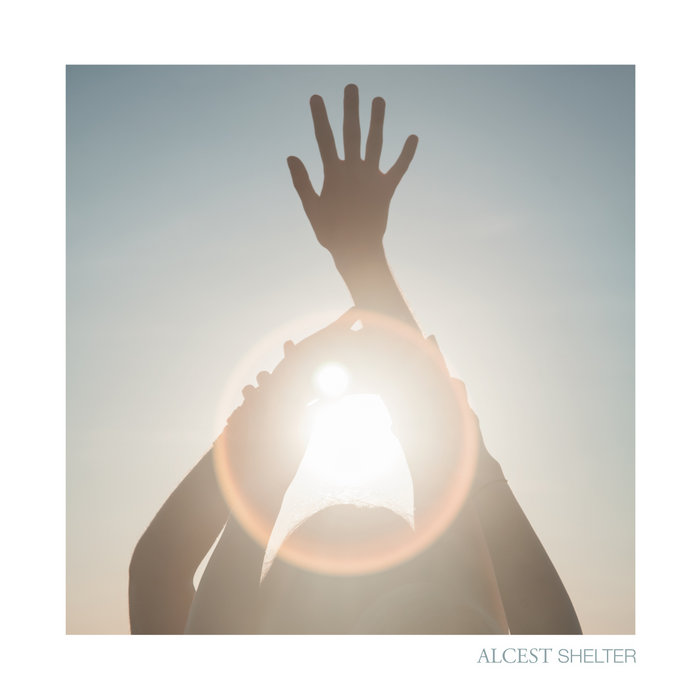
Light is everything for Alcest, and also for me as a person. I grew up with it in the South of France, as you said, and it’s a part of my identity. I need it on a daily basis to feel at peace. That’s also surely why my two favorite seasons are Spring and Summer, which I pay tribute to in many of my songs’ lyrics. I also remember that originally it was one of the reasons why I wanted to make this project, thinking «So many bands in the Black Metal scene talk about hate and darkness. Why hasn’t there been any (project) with more luminous, ethereal and positive aesthetics? ». Parallel to that, Alcest deals with a lot of different ideas, like spirituality or the feeling of not belonging down here, nostalgia, etc. But yeah, the «light» component has always been really important in this project.
Many people do not accept or see the (super)natural world as a world parallel to what they perceive – how deep is your belief in such things?
Well, I can understand these people, totally. If I hadn’t had a spiritual experience myself when I was younger, I would surely believe in nothing and just consider the reality we see as the one and only. I believe we only can grasp very little of this reality, because of the limit of our human senses, but reality is probably much vaster than what most people think. I always have felt trapped in my own body, within my earthly senses, and therefore felt a lot of frustration because of this. Music, because of its universal and transcendental aspects, helps me cope with it and I speak about all this constantly in the lyrics of the band. I consider our life on Earth to be like an experience, a journey limited in time, an opportunity for us to grow, learn, deal with various feelings linked to this world of matter. Feelings such as pain, joy and everything in between. Nobody is perfect and we are all going to make mistakes during our experience down here, but I believe that the ultimate goal is to spread as much love as we can. Then, when we die, we go back to where we came from, have a look at our own actions, and do it all over again. These are things that I strangely have felt within me since a really young age, almost in an instinctive way, but I am never going to try to convince anyone of it. That’s why I consider myself a spiritual person but I really dislike religion in general for its arrogance and its will to control people’s believes and actions, but this is another subject obviously.
Did bands like Mogwai or Godspeed You! Black Emperor or Codeine or My Bloody Valentine really influence the change in your sound back in the day, like many people try to explain the shift in your music after a few years of Alcest’s existence?
It depends on the bands. At the time I was recording my first album Souvenirs… I just started to discover Shoegaze and Post-Rock. My inspirations were actually more spiritual and nature-oriented than musical. The songs for my album were already written at this moment, and I guess these styles of music had an influence on my sound only during the last steps of the recording. There were some bands I already was familiar with though, and who certainly influenced me. Explosions In The Sky, The Smashing Pumpkins or New Order for their melodic bass lines. Dead Can Dance also had a big influence on me for the atmospheric/tribal quality of their music. I also was listening to a lot of Yann Tiersen at this time and loved how nostalgic and delicate his songs could be.
You became a member of the French metal scene early on, how was growing up in it? Have you ever felt unaccepted in any way?
I guess because of my specific perception of things I was not at all the typical Black Metal dude. Also back in the day most of the Black Metallers were listening to metal only (Thrash, Black, Death, Heavy) whereas I early on got into totally different styles of music like Indie Rock, Dream Pop, New Wave, which I remember some of the purists were not approving of at all. It’s funny to think about it now considering how open-minded the metal community became in recent years. When I started the band, because of its uplifting vibes, Alcest was for sure really unconventional, and a lot of closed minded metal heads didn’t know what to make out of it. I didn’t care about it and just kept on doing my own thing.
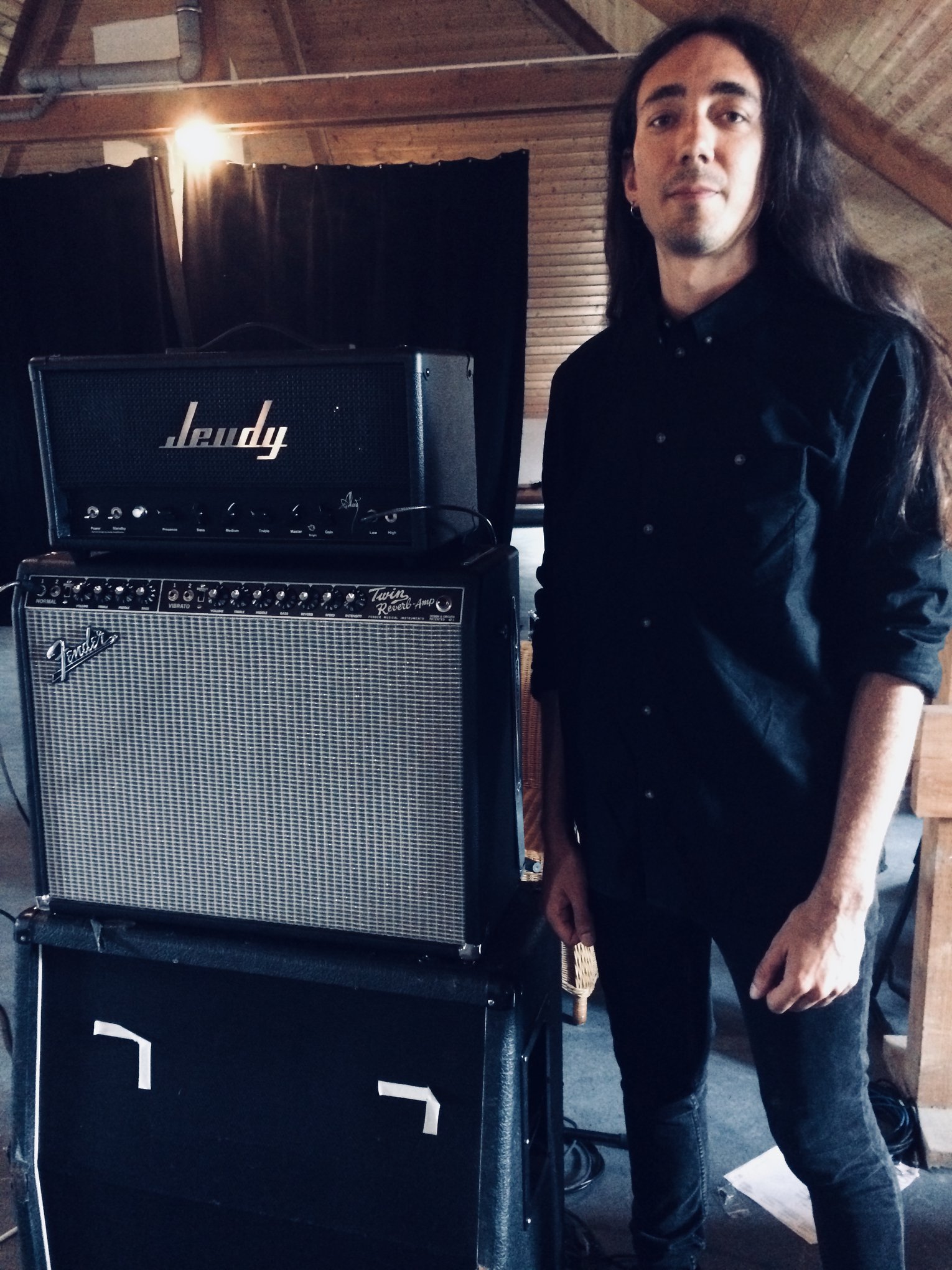
If you had to explain your music to a film nerd who has no real idea of metal music – how would you describe the music of Alcest?
Once I said to someone as a halfway joke ”I guess it sounds a bit as if the Elves in the ‘Lord of the Rings’ were having a rock band”. I think it’s a pretty accurate description (laughs). I am not very comfortable with labels when it comes to Alcest’s music.
Listening to Alcest often has a very soothing effect on people even though the music has that black metal foundation – is that just my emotion or is that something that is important to you – to affect people in a positive way? And if so, how do you know that this song or this part can have that effect?
Yeah, even if Alcest’s music can be melancholic, or even angry at times, I always wish for people to get a positive effect from it. A lot of our fans tell us that our songs truly help them. It’s one of the best things someone can tell an artist I suppose. As for my way to put such feelings into the music, I tend to think that the emotions I get while writing an Alcest-song are the ones that people will also get while they listen to it, so I take it as a good reference point. Most of my work is very visceral and connected to my intuition. And it’s this same intuition that tells me when a song is finished or needs some more work, or when it is just not good enough to be on an album. I have a very instinctive way to write music, all emotion based.
Coming to the new record that you are working on – can you give us any hint at what it will sound like? What it will be about?
Our last two records were darker than our first ones, especially Spiritual Instinct, which is probably the heaviest/darkest Alcest record so far. The new record we are working on is coming back to a more «fragile», otherworldly and melancholic side of Alcest, a bit like we had it on the two first albums, but with a more modern and elaborate approach. We are taking our time making this album because we feel that it has a lot of potential and we want to make something ambitious, artistically speaking. There will almost be a «soundtrack»-approach to it, as it will probably feature other instruments/arrangements than just the usual guitars/bass/drums/vocals. I can’t tell much more about it but we are really excited about how it will progress.
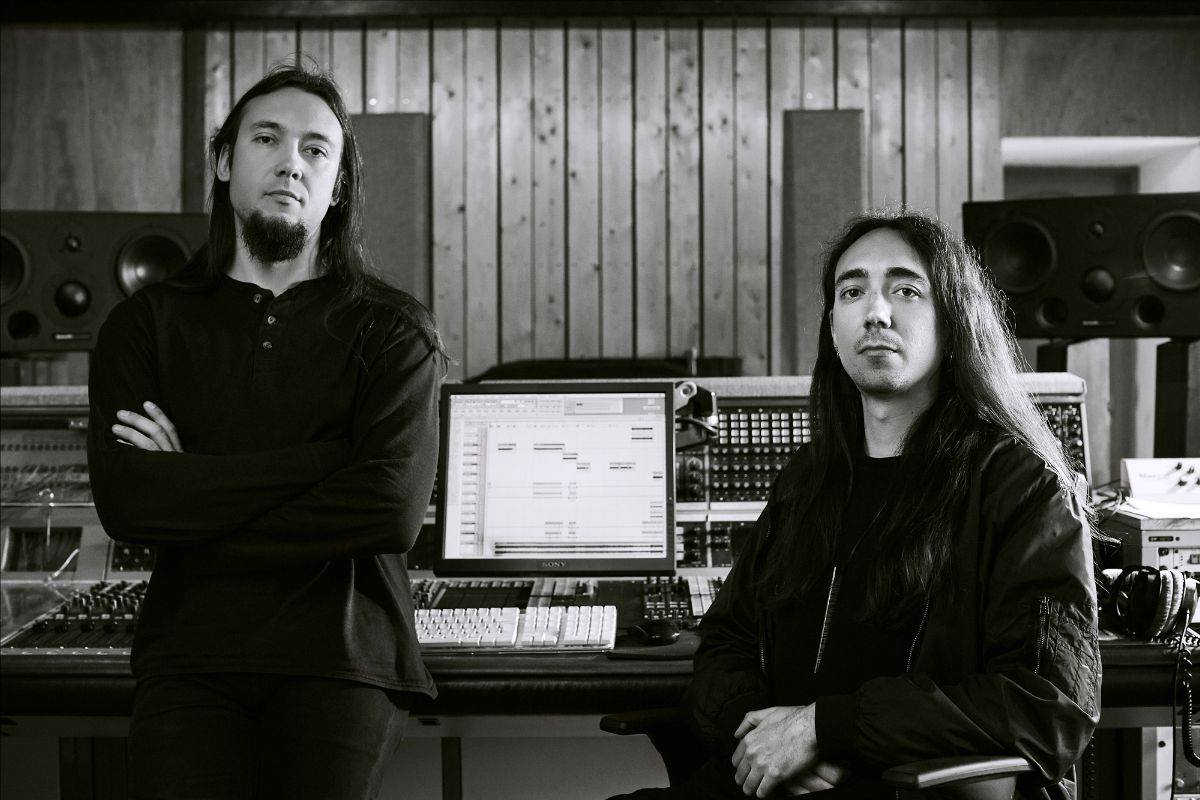
(Photo Credit: Studio Picture by William Lacalmontie)
Continue reading > -
Interview with Jarboe (solo, Swans, Neurosis etc.)
 24 Dec 2022 - Thorsten
24 Dec 2022 - Thorsten
Here we are now - entertain you! The Veil of Sound Xmas-Interview-Marathon 2022 is upon you. We will give you one interview with an amazing artist or band every day. Some will be podcast-only, some text-, several video-based interviews. And of course we want to give you some of the finest and most popular artists around - need proof for that? Well, how about we kick this off with Jarboe! Yes, the one! The lady who certainly changed Michael Gira’s life and Swans’ sound. Who released an awesome collab with Neurosis and so much more!
There is also a very up-to-date-reason for this interview - the re-release of one of her seminal solo-releases: Sacrificial Cake which originally was released nearly 30 years ago. At a time, when it was considered to be a twin-record to Gira’s Drainland (there were even some promo CDs sent out with tracks from both records). The record is mindblowingly different and diverse and doesn’t shy away from tracks that at first glance don’t fit in with the tracks before or after. Nevertheless, there is one thing that connects them all - Jarboe’s voice and musical quality. We talked with her in detail about the record, its songwriting and production, the influence of New York City and much much more! We are very proud to kickstart our hearty VoS-Xmas-Interview-Marathon with this nearly one-hour long interview which you can listen to here straight away or on the streaming platform of your choice:
You can also grab your copy of the re-release of Sacrificial Cake via The Circle Music!
[Photo Credit: M. Lasalle]
Continue reading > -
Interview with Tom Hazelmyer (Amphetamine Reptile Records)
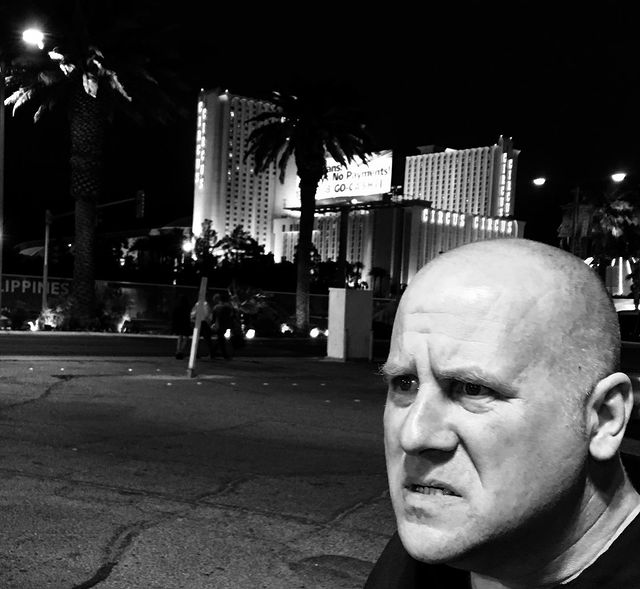 11 Dec 2022 - Thorsten
11 Dec 2022 - Thorsten
Boss Hog. Unsane. Helmet. The Melvins. Yes, musically these are very diverse bands. But as diverse as they are, or as they might be seen nowadays, there is something that connects them all: They all released on the legendary Amphetamine Reptile Records label once and that really meant and means something as the label from Minneapolis has played a hand in many careers. Therefore we are really happy to talk to Tom Hazelmyer, the founder of AmRep
Back in the day it seemed like AmRep was the “biggest indie” label on the planet, with maybe the best “nose” for great bands and when you released an EP or an album even through Tom’s label, you could be sure that people would notice your band. But whether this notion of the biggest label on the label also co-related in a huge number of people working there - well, if you want to know that and much more - then you should watch this video with Tom in which we talk a lot about AmRep’s history and “business model”, about the fact that Tom witnessed the explosion of an alternative scene twice and even more about the relationship between AmRep and The Melvins, whose King Buzzo also provided us with the wonderful picture of Tom. Enjoy all you VoS-aficionados out there and tell us - which label shall we shed some light on next?!
[Photo Credit: Buzz Osborne]
Continue reading > -
Interview with Sally Gates (Titan to Tachyons and more)
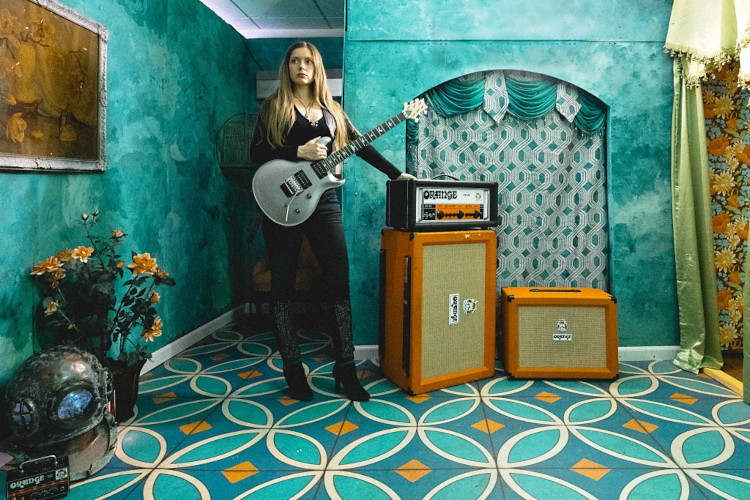 07 Dec 2022
07 Dec 2022
Fusion - one of those terms that many people detest even though they do not have the slightest clue what it means. Yes, it CAN have roots in Jazz, or in Metal. Or both. But basically it means nothing else than the co-existence of two or more different elements within the same settin of time and place. That does not necessarily make it artsy-fartsy as many people think, but man, some of those ‘fusionistas’ can really rock it out as hard as many Metal-musicians can’t. Thus, our advice - don’t overestimate your own knowledge or underestimate the hardness of that “genre”. Oh why do we say all of that right here? Because our man Joshua also talked about the term with Sally Gates, who is a miraculous virtuoso on her instrument and part of Titan to Tachyons, which we reviewed a short while ago. So, take of any bias towards the genre and wrap your head around this interview!
I was incredibly fortunate to connect with Sally Gates, leader, composer, and guitarist of the powerhouse instrumental band Titan to Tachyons, whose new album Vonals (here is our review) was released on John Zorn’s Tzadik label on September 16. Despite her busy international traveling and gigging schedule, she graciously answered a range of curious questions about her history, recent non-Titan solo and collaborative performances, worldviews, and visual artistry, among other themes. I hoped to use this occasion to shine more of a spotlight on Gates’ consummate artistry, her process and sources of inspiration. Thanks to her incredible candor, I got that and more — including the scoop on some upcoming projects to look out for. Enjoy!
Kia ora, Sally!
Congratulations on the release of the second Titan to Tachyons album, Vonals! I can’t thank you enough for taking the time to answer these questions, especially on the heels of a very busy period including the Vonals release tour, numerous international press features, and a return to New Zealand to play the Wellington Jazz Festival, several improvisational gigs, Vitamin S Fest … oh my! Have you caught your breath yet?
Only just! It’s been a rather busy & intense year. I’m still here in New Zealand for a series of performances around the country after the Wellington Jazz Fest, and I am also spending some long-awaited quality time with family.
I enjoyed your article published in the Dominion Post & Stuff. In it, you touch on your connections to places like Tairua — a special creative sanctuary for you — and the pain of being estranged from them for so long because of the pandemic and other contingencies. How has your homecoming after four years been going? You must be experiencing a lot of excitement, relief, but also some mixed emotions, after so long away.
It’s amazing to be home after so long. It felt pretty strange to be back at first, but now I’ve settled in & adjusted it’s feeling more normal. The country has changed a fair bit in these four years culturally and physically, with new developments, so some places are simultaneously nostalgic and unrecognisable. I’m definitely excited to be here for the summer, as I love exploring and going on various outdoor adventures like hiking, kayaking, and surfing.
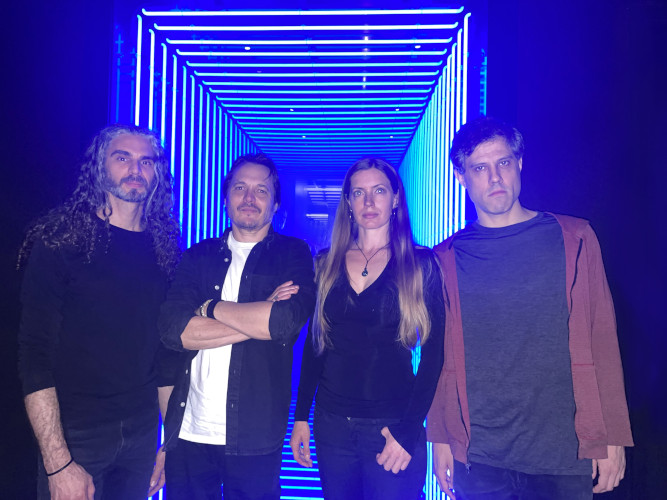
In or out of the jetlag fog, what were your first home-again musts: people to see, places to visit, foods to eat?
Family was number one. Then the beach, coffee, sushi. (Which is pretty typical wherever I am.)
As a commissioned artist for the 2022 Wellington Jazz Festival, you presented Thought & Terraform, a new solo guitar work exploring the relationship between consciousness and perceptual reality. Thematically, this sounds like an extension of your recent compositions for Vonals, though I’m curious what other musical textures make up this piece. Can you characterize the performance for us and maybe how your approach to composition changes in a solo context? Did you include looping or live sampling? Were there other techniques you hoped to highlight in your composition or performance?
The commission was a great opportunity to focus on what I can do solo, as I’ve spent the majority of my career writing for and playing in bands.
Thought & Terraform had a set form and motifs that were expanded and connected through improvisation, however the overall piece was rather textural and abstract. I used a looper to build layers, sometimes adding extended techniques to create percussive elements and walking basslines to give the effect of rhythm section. I’ll be premiering the piece in the US on January 22nd in San Francisco.
Awesome, I can’t wait! I was hoping we might get another opportunity to hear this work.
Can you share more about the “terraforming” side of this concept? Are you exploring the extent of our control, imaginary or practical, over the worlds we create and how we go about inhabiting them?
The title is based on the book Thought Forms (Besant & Leadbeater, 1905), which explores the range of colours and forms visible in the human aura manifested by different thoughts and emotions. Thought & Terraform takes this premise a step further and includes a theory from The Holographic Universe (Talbot, 1991); consciousness manifests the world around us, shaping physical reality.
The Wellington Jazz Festival acknowledges the indigenous cultures and traditions of New Zealand, including Maori language on its website and embracing the Maori name for the islands and islanders, Aotearoa. I don’t think I’m overstepping when I say that the majority of Americans struggle to reckon with the anti-BIPOC colonial history of the United States, let alone practice land acknowledgements or make diligent efforts to understand indigenous cultures and tribal sovereignty. How do you feel New Zealand is faring on these obligations?
This is a great question which highlights an important issue; however, I don’t feel mine is the most qualified voice to answer it. As an observer, I can say that Maori culture has always been present in New Zealand, and over the years since I moved to the States, I’ve noticed a marked effort to acknowledge it and further integrate it into everyday practices, with a focus on fostering the language into common use. Over the last 40 years there have been major land reparations and compensation from the Crown as a result of Maori protests beginning in the 1960s, which were aimed at repairing injustices dating back to the 1840 Treaty of Waitangi.
You have lately been exploring the dynamics of control and chaos, to pick up on some language from your article. Your music for Titan to Tachyons tests the dimensions of the liminal zones between composition and improvisation. What about in situations where you’re playing free, such as on the jazz festival circuit or gigging with players in New York (as in your recent trio performance with Zoh Amba and Brian Chase)? Is there a different energy you bring to those sets to manage the inherent “chaos” of the encounter, where compositional constraints are not necessarily the primary concern?
There’s a different energy when playing entirely free, in that you’re listening and reacting to the other players, while also making choices on the spot with an interplay between leading, following, countering, etc. A lot of the time I’ll form groups with people I’ve never played with before, as half of the fun for me is discovering other people’s ideas and vibes while creating a rapport in a live situation.
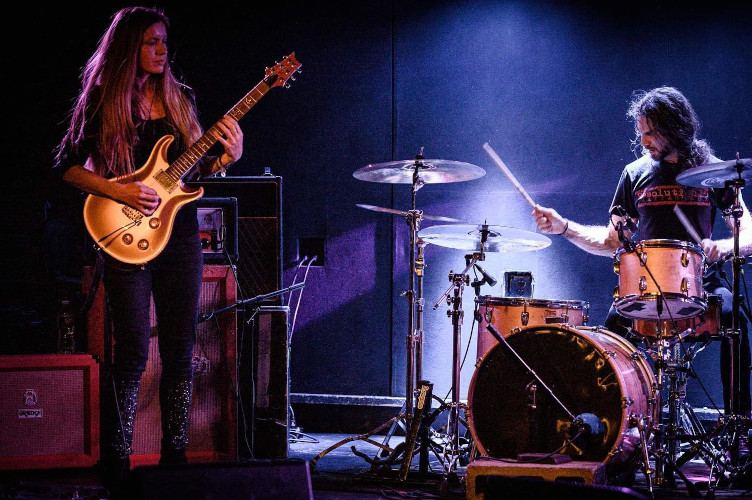
In recent memory, aside from Kenny, Matt, and Trevor, with whom have you made the most powerful connections in an improvisational setting?
The trio with Brian and Zoh was an exciting combo that I’d love to do more with. I played duo with Sam Ospovat earlier in the year which had a lot of great moments too. Back in 2019 I put together a trio with Trevor and Greg Fox for a gig. We ended up recording an album together that will be coming out soon on Riverworm Records.
Trevor Dunn’s new label! I look forward to hearing that recording.
I was hesitant to use the term “Fusion” in my review of Vonals because of its pejorative overtones; nonetheless, I find the concept fits the uncompromising blend of Jazz and Metal I hear in Titan to Tachyons and it gave me a way of contextualizing that for others. I also believe that “Fusion”—as a cultural ethos, not necessarily as a marketable commodity—is due for reappraisal. What are your feelings about the term “Fusion” and how it may or may not apply to Titan to Tachyons?
“Fusion” as a genre makes me think of the ‘70s era bands, but as a general term it’s as un/helpful a description as any other label such as “Jazz-Metal”. We’re not Jazz nor a Metal band, but there are elements of each present, so “Fusion” could potentially be more accurate.
It sometimes feels like we’re going through a moment of greater crossover appeal between Jazz and Metal, Jazz in Metal, vice versa. So many incredible artists are making profound statements informed to varying degrees by both musical traditions. What I find exhilarating about Titan to Tachyons is your attempt to represent those equally, without excuse. Jazz and Metal are not just flavors or colors in your music, but part of the structural DNA. Uncompromising, mad scientism. How did you discover this style? Was there a turning point in your musical development that you can point to and say, here everything started coming together — these are not just different musics but part of a greater whole? Was there a moment of extrinsic or intrinsic permission allowing you to see things this way?
Titan to Tachyons was about discovering my musical voice. There were no conscious decisions on style; I followed a mantra of “write for an audience of one,” which you could say was a continuing moment of permission that really helped me get through creative roadblocks and allowed completely free expression. In my early years of playing music, I was predominantly listening to and playing metal. As my tastes evolved I began discovering more experimental and Avantgarde music, as well as developing a taste for Blues, Jazz, Trip-Hop, Dub, and more. So when I began to focus purely on writing my own music, it came out as an amalgamation of these tastes.
There may also be a lag in terms of audiences appreciating the kinship and diverse uses of these musical traditions. No matter how visceral and compelling the musical experience may be, metalheads can be reluctant or afraid to go “too far” engaging with the language of Jazz and improvised music, while so many jazzheads continue to regard metal only with a side-eye. What’s going on here? What would you like to see happen in this dialogue?
I feel like a vast amount of people are already pretty open to these crossovers, and it makes things very flexible for us as we’re able to bounce between playing different types of line-ups and venues, for example fitting into a Jazz festival or playing Metal clubs. I’d like to see that continue as it makes for more interesting and enjoyable shows, while expanding our audience and network.
Your artwork for both Titan albums is incredible—mesmeric and full of evocative movement! You’ve been playing music since you were a child, correct? What about your visual artistry? When did that start and what’s the relationship between your various artistic outlets? Do you use your drawing and painting as a workshop for musical ideas?
Thank you! I began both music and art around the age of 5, with more of a natural talent for art. I’ve pretty much always been able to create the images that were in my head through artistic mediums, but struggled to write music. Things began to click for me when I started to look at music composition more visually, and the two became intertwined expressions of singular concepts. One thing I love to do is paint and listen to music for inspiration.
(The debut record by Titan to Tachyons Cactides)
Unwrapping the album led to some delightful surprises! Inside the CD cover there are visual captures taken from your sketchbook with score notations and arrangement patterns, including musical reference points like Hendrix and Slonim as well as interpretive glosses on moods like “disintegration” and “vertigo.” And the liner notes! I love these glimpses into your process. How has your process changed or grown from Cactides to Vonals?
Vonals was more of a deliberate process, in that I knew who I was writing the music for. This allowed me to utilise everyone’s strengths and open things up for their individual creativity. After Cactides I’d started writing material with more of a focus on counterpoint, and it was calling for a third melodic voice, so getting Trevor on board again was perfect timing. I also had a focus on minimalism, wanting to do more with less by expanding two or three ideas into a whole song rather than having 13 different sections for example, like “The Starthinker is Obsolete”. Vonals was also much more intensive, written over 18 months as opposed to the three years or so I spent on Cactides.
With the more stable addition of Trevor Dunn to this record, you’ve had to work more creatively with arrangement and counterpoint—to stunning result. Vonals sounds incredibly lush and spacious, even with all these similarly voiced instruments. It’s amazingly well choreographed. Do you anticipate continuing in this direction and have you considered experimenting with other instrumentation for Titan? I’m outside imagining how a trombone or —gasp!— additional percussion would sound in the mix.
I’m always open to additional instrumentation, but I do like to be able to play everything we record live, so that gets factored in. Typically I would try to create any new sounds within the band by using extended techniques or effects pedals before bringing in a guest musician. Kenny threw in some percussion in “Blue Thought Particles”, and it’s a road I’d like to explore more of with him.
As for direction, I feel like we only tapped the surface of what’s possible in regards to arrangement and counterpoint with this line-up, so it’s definitely something I’m interested in exploring more.
I have not had the pleasure of seeing Titan to Tachyons live … yet! But I’ve enjoyed watching available recordings of your performances. I’ve noticed you are very watchful during live performances, partly conducting or just being in the improvised moment, but you also appear to enjoy watching the audience. How would you characterize your “awareness” on stage and connecting with your audience?
One thing I love about having an amount of improvisation in the music is that it keeps you present in the moment, listening and communicating with each other. The written material is not something I can play entirely on autopilot either, there are a lot of cues & conduction happening, as well as keeping track of the form, etc., so you could say I’m very aware most of the set. Looking at the audience is a way to connect with them.
What is the secret of your star tone, Sally? What’s your setup? Are you in standard tuning most times?
My setup is pretty straightforward. I have my PRS Custom 22 Goldtop as my go-to favourite for a warm and smooth tone, and it has the versatility of a 5-way pickup switch and tremolo. I use an Orange OR100 tube amp with their PPC series cabs. (The amp can switch from 35-100 watts, and I have a 1x12 or 4x12 cab to match.) I have a variety of pedals that run different effects, such as modulations and delays. For distortion I use a Friedman BE100 live, and on the album I put together a combination of a Friedman clone and the BK Butler Tube Driver.
I use standard tuning. I like that it consistently trains my ear and fingers to know where each note is, and also for better communication between other musicians.
What does it mean to “Close the Valve & Wait”? How integral is this to the interior cosmic journey Vonals invites us on?
This track explores tension and textures through a freely improvised session, creating an unsettling build to the final passage of the album’s journey.
You’re always reading and watching interesting stuff. What’s currently inspiring you?
The book that inspired me the most recently was The Holographic Universe by Michael Talbot. A lot of weird synchronicities popped up around and in this book, even during the process of trying to hunt down my own copy.
Yayoi Kusama and Victor Vasarely are two artists that became a large part of the visual inspiration for Vonals. I’m currently reading How to Build a Time Machine: The Real Science of Time Travel (Brian Clegg) and looking for the next book in Phillip K. Dick’s VALIS trilogy. Undone is also a great TV series, which explores the nature of reality and time from a girl who may or may not be experiencing schizophrenia.
Would you like to share any other news about the future of Titan to Tachyons or other projects coming up?
Titans are beginning to book shows for 2023, and I’m starting to think about the shape of the next album.
As I mentioned earlier, I have another project with Trevor and Greg Fox. We recorded an album a little while back which will be coming out early 2023 on Riverworm Records. This is an improvised record with Trevor on upright bass and Greg on drums & modular synth.
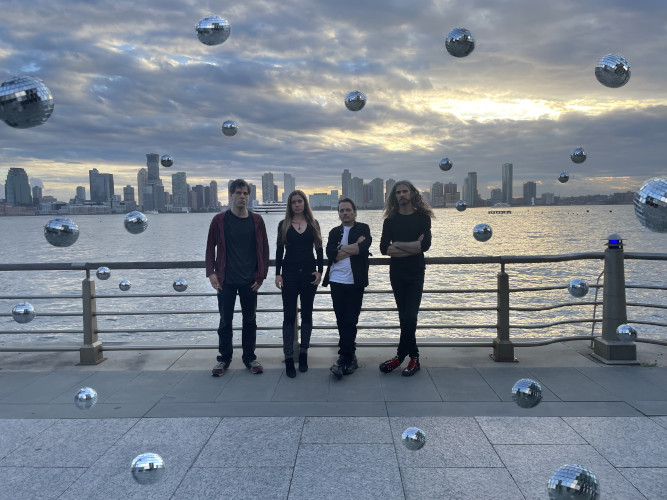
It’s tradition to close VoS interviews with a round of rapid-fire questions. Feel free to answer and elaborate as you like:
Favorite Red Dwarf character or favorite Red Dwarf episode? I may have been a tad obsessed with the Cat growing up. Favourite episodes are hard to narrow down: “Parallel Universe,” “Backwards,” “Quarantine,” “Back to Reality,” “Gunmen of the Apocalypse.” I could go on.
Favorite Miles Davis album or favorite death metal album? These aren’t quite death metal, but Today is the Day, Sadness Will Prevail; Cryptopsy, None So Vile; and Emperor, Anthems to the Welkin at Dusk.
Twin Peaks, Twin Peaks: Fire Walk with Me, or Twin Peaks: The Return? Twin Peaks.
Winters in New York or summers in Miami? NY Winters. Ask me again in 10 years.
North Island or South Island? South Island
Best Hāngī or best Fish ‘n’ Chips? Fish n chips from the Kai Kart on Stewart Island.
Whitebait, Kina, or Pāua? Pāua
Beets on burgers or pineapple on pizza or other sacrilegious behaviors you’d recommend? Toasted Marmite and cheese. I also used to condone beetroot on burgers as a kid.
Best beach reading or best mountain soundtrack? Kyuss is the best beach soundtrack.
“Stonehenge” or “Big Bottom”? Big Bottom
Indeed. Always more bass. Thank you, Sally!
[Photo credits: Band pictures - Naeemah Z. Maddox; Live photo - Brandon Daza; Sally alone - Karen Jerzyk]
Continue reading > -
Interview with Matt Wainwright (Cold Gawd)
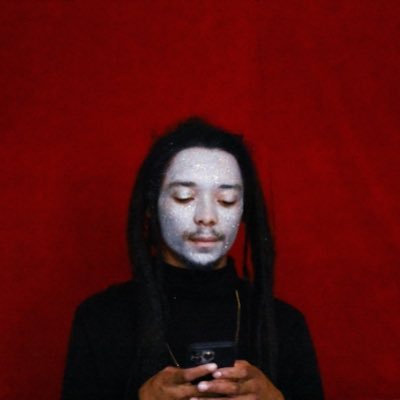 05 Dec 2022 - Thorsten
05 Dec 2022 - Thorsten
Get Me The Fuck Out of Here was a knucklehead jab out of nowhere. Nobody here had expected this sound which is as warm as R’n’B (YES!) and as dynamic as classic Shoegaze. An interview with the mastermind behind a band that no one should miss who is into surprising records!
When talking to Matt Wainwright one has the feeling of talking to a person who is quite chilled on the hand but really serious about his music on the other hand. In some way that also reflects in his music. Shoegaze is a genre which could also be described as a ‘white boys club’ with only seldom people of color joining in for the fun of staring down at your sneakers. And when one comes around who knows about that, who is not angry of being alone in that club with his friends and of being the standout act then that can become either a novelty act or a somewhat groundbreaking release. Cold Gawd’s recent full-length made us believe that this is the second - something not really heard of before. Reason enough to talk with Matt and find out how he sees his band’s position inside the genre. And maybe also what “Magic Matt” has to do with it ;-)
Continue reading > -
Interview with Ghost Bath
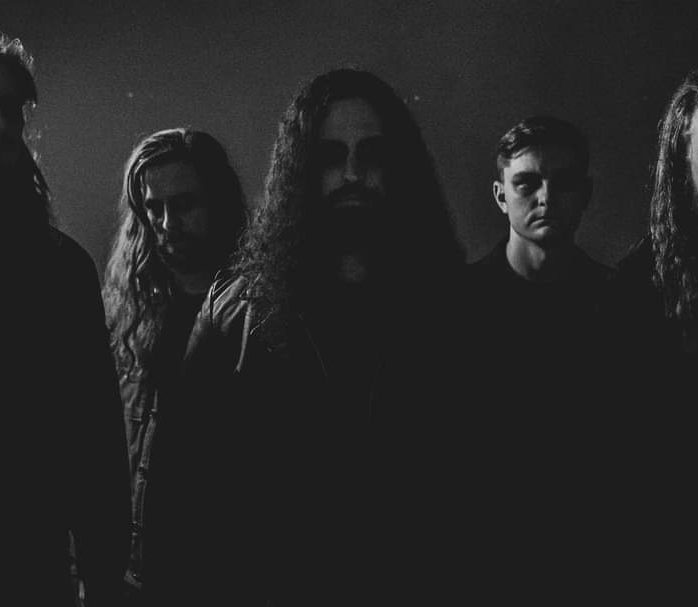 28 Nov 2022 - Thorsten
28 Nov 2022 - Thorsten
This is an interview which might have been the longest in the making. Roughly a year ago, Ghost Bath released their latest album Self Loather (review here) and we were really taken with it. Therefore we are more than happy that we now finally got the chance to talk with one of the guys behind the project to talk a lot of things - including the way the music works for them and is created in a way that at least the interviewer would not have imagined!
By definition, a ‘ghost bath’ is a specific way of taking one’s own life, with the remaining body being drowned and thus looking like a ghost. However, when talking with a member of one of the American DSBM bands, namely Ghost Bath, it would be much too easy to only focus on that topic, as Tim has much more to talk about. Thus we touched upon which kind of music he likes to listen to, how Self-Loather is the end of a trilogy and how much of it was written and created during the pandemic. Among other things!
Continue reading > -
Interview with Jozef van Wissem
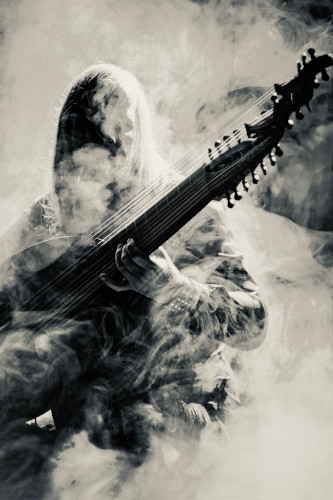 26 Nov 2022 - Thorsten
26 Nov 2022 - Thorsten
Enigma. That’s a word very often read or heard when people are talking about Jozef van Wissem, the man who brought a record back from the dead, who basically invented a genre only he fills and who has created some of the most memorable soundtracks of the last few decades. Jozef van Wissem has recently released a new record via Incunabulum Records: a score for the black and white classic Nosferatu by German movie pioneer F.W. Murnau. All of that were reason enough for us to seek an interview with the man.
There are more photos of Jozef van Wissem wearing a very characteristic hat and is mostly clad in black clothes. This shall not imply that his world only has two sides, but that he has a certain taste in clothing, lifestyle and also a pretty particular (and very good) taste in music. Even though many know him from his work with Jim Jarmusch or his releases on Consouling Sound, one should never forget that he also has a vast knowledge of music, from everything, the early modern to Baroque and to modern day music. From classical composers to Drone metal avantgardists. Enjoy our interview with the man who gave the lute a good name (again).
Jozef, thanks for doing this – you are on tour right now, so let me ask you: How have the gigs been so far and which place are you looking forward to playing the most? Any venue in particular? Any city? If so – why?
I am looking forward to playing Russia and Ukraine again. I miss them both. In Moscow I played in a huge cathedral for over 1,000 people. In Ukraine there was lute mania when I did concerts, girls would faint during the concert. I used to go to there every year and I have friends in both countries. That doesn’t compare to playing in Paradiso Amsterdam for tourists.
When you are on the road, is that a total solo concert or do you have a backing band?
I play solo. I did about 1,500 solo concerts worldwide, more shows than the Ramones did. When I go to a concert myself I prefer to see solo artists, too. You can’t hide behind your band members when you play by yourself. You are naked and pure.
According to some sources you started playing the lute at a young age, is that true? And what about the lute made you pick up this rather unusual instrument?
No. That’s not correct. I studied classical guitar at a young age. I started playing the lute when I moved to New York in my early thirties. My lute teacher Pat O’Brien was an ex-guitarist who studied with Reverend Gary Davis. He had the right attitude and made me write my own solo pieces for the instrument. That would not have happened in Europe.
Is the variability of the instrument one of the things that attracted you, its position between old and new music?
What attracted me in the instrument was the technique. It’s more difficult than the guitar. It took six years for me to master the lute. Also what attracts me is its female form. I know I am not supposed to say that. Forgive me for appreciating female forms.
Would you say that this “center” position between a baroque instrument and the possibilities of modern music making (amplification for example) make it a special thing?
Obviously.
Was its “transportability” also important for you? For example, you cannot carry a harpsichord or a spinet around with you all the time? And they are also instruments very much associated with the beginning of early modern music.
The transportability of the lute was important in the middle ages when it could be carried on horse back. Nowadays it’s not easy to carry on an airplane, it requires an extra seat. Not good for the environment I know.
Your way of playing the lute is quite different from what many people would think about the instrument, because you use feedback and electrical amps at times so that the sound you produce is not the thing that most (uninitiated) people would imagine, as they’d likely expect to hear a typical medieval thing like a lyre. To make it clear: how do you produce these sounds – during the writing process, in the studio and on stage?
During the writing process I use lute, guitar amps, guitars, electronics, field recordings, vocals. The same on stage. In the studio I try to update the lute with modern tools. When I play the Nosferatu score live I use all these sounds. The Bird sounds are on the computer, I ran them through some condensator effects. The 12-string electric guitar I use has an alternate tuning so you get this drone effect.
What are some of your favorite composers…
a) from the Baroque or Early Modern period? Baroque anything by Silvius Weissb) from today? Morton Feldman, John Cage, Coil, Nurse With Wound.
Was there any particular moment in your career where you thought ’Okay, I know got this! I know what I can get out of the lute!’ or are you still striving to find your sound?
That depends more on how good the lute is you are using. I am lucky to work with great lute builders. The sound of the lute depends on the room you play it in. I can play the same pieces but they all sound different in a different room like a church with seven seconds of reverb.
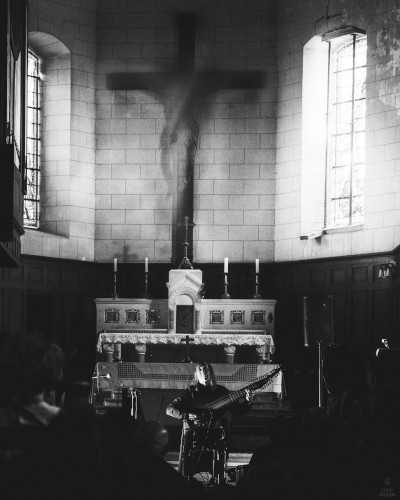
Do you consider yourself primarily a lutenist or a composer? Composer/Lutenist
Now, your new record is a score to the German black-and-white classic Nosferatu by Friedrich Wilhelm Murnau. I think that your music lends itself particularly good to black-and-white movies. Is there any other b/w movie that you would like to score?
Yes, I am working on Der Müde Tod by Fritz Lang. I saw it recently and immediately I got some musical ideas for it. It will premiere in February in Warsaw.
How were you able to sonically reproduce the sound of dying birds on the record, because that is what one hear throughout several tracks, in particular the last two?
I found a double 7 inch with bird sounds on a market and used it trough condensator effects and so on. In the movie there is the description ’The Call Of The Death Bird’<7i> in reference to Count Orlock. To me ‘the Death bird’ is today’s corona bat.
When looking at the tracklist it becomes clear that you arranged it in acts, like a classical drama. “Act 5”, the longest act, takes up basically the second half of the record. How did that happen?
Act 5 has the actual length of the ”Act 5” film part in the German version of Nosferatu. The British version (BFI) doesn’t have those numbered acts in the film. Which is confusing for me when played live.
Are there any role models for your drone sound? What do you think about acts like SunnO))), Earth or OM?
I love all of those bands.
Is it true that you first wrote your score and then watched the movie – what was/is the reason behind it?
I don’t like the reactive idea; the idea of reacting to the images. It’s for monkeys. I like to influence the atmosphere and color of a film beforehand, before they shoot.
So, is it correct to say that the score was first of all composed for the live showing and not for recording sake?
That’s correct.
One collaboration that we might clue up for our readers – how could you “do a record” with Aleister Crowley?
I was invited by Cleopatra Records to use one of his recordings. I collect his books. It came natural. [I am] very happy with the collaboration. It’s great to work with dead writers or filmmakers. People forget sometimes Crowley can be funny too, not just occult.
Very often, one can read about the exquisite nature of your performances – for example performing in St. Petersburg at the Hermitage in front of Caravaggio’s ‘The Lute Player’. How did that make you feel?
The painting has the sheet music of this piece they made me play, I had it intabulated for the lute but in front of the audience I changed the piece. This became “You Know That I Love You”.
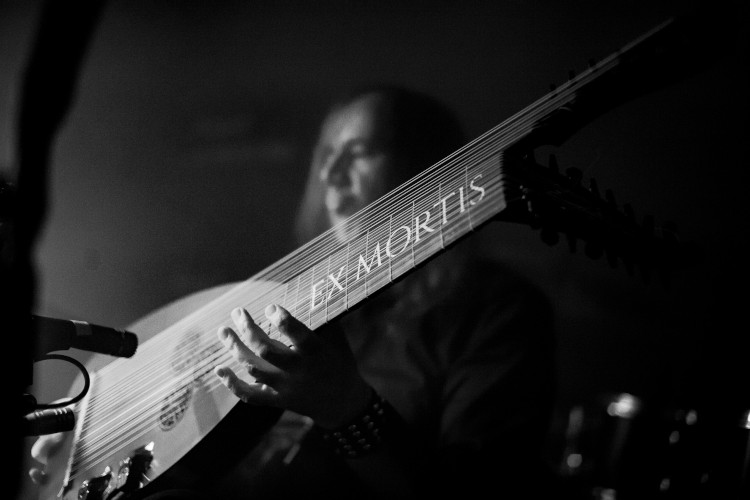
Jozef and 'Ex Mortis' You also have had a new lute for a few years with the words ‘Ex Mortis’ on it, right? What do these two words mean to you, as they were also the title of your last record on Consouling Sounds?
It means I am bringing back the lute from Death. The instrument disappeared for 200 years after 1700. Back then it became to complicated to play, there were too many strings so it died out. Then it came back with the Wandervogel-movement in Germany in the early 1900s They gave guitar lutes a bad imitation.
A magazine once described you as a crossover between ’a medieval monk and a Satanist Rasputin’, how do you feel about that description?
I was sort of pleased when I read that. Now I am not so sure.
Thank you very much Jozef for your time and these might interesting answers!
You can get your copy of Jozef’s new record via the Incunabulum Records’ webshop.
[Photo Credits: LCDO Visions, Michal Sobocinsky and Teemu Nordland]
Continue reading > -
Interview with Gospel
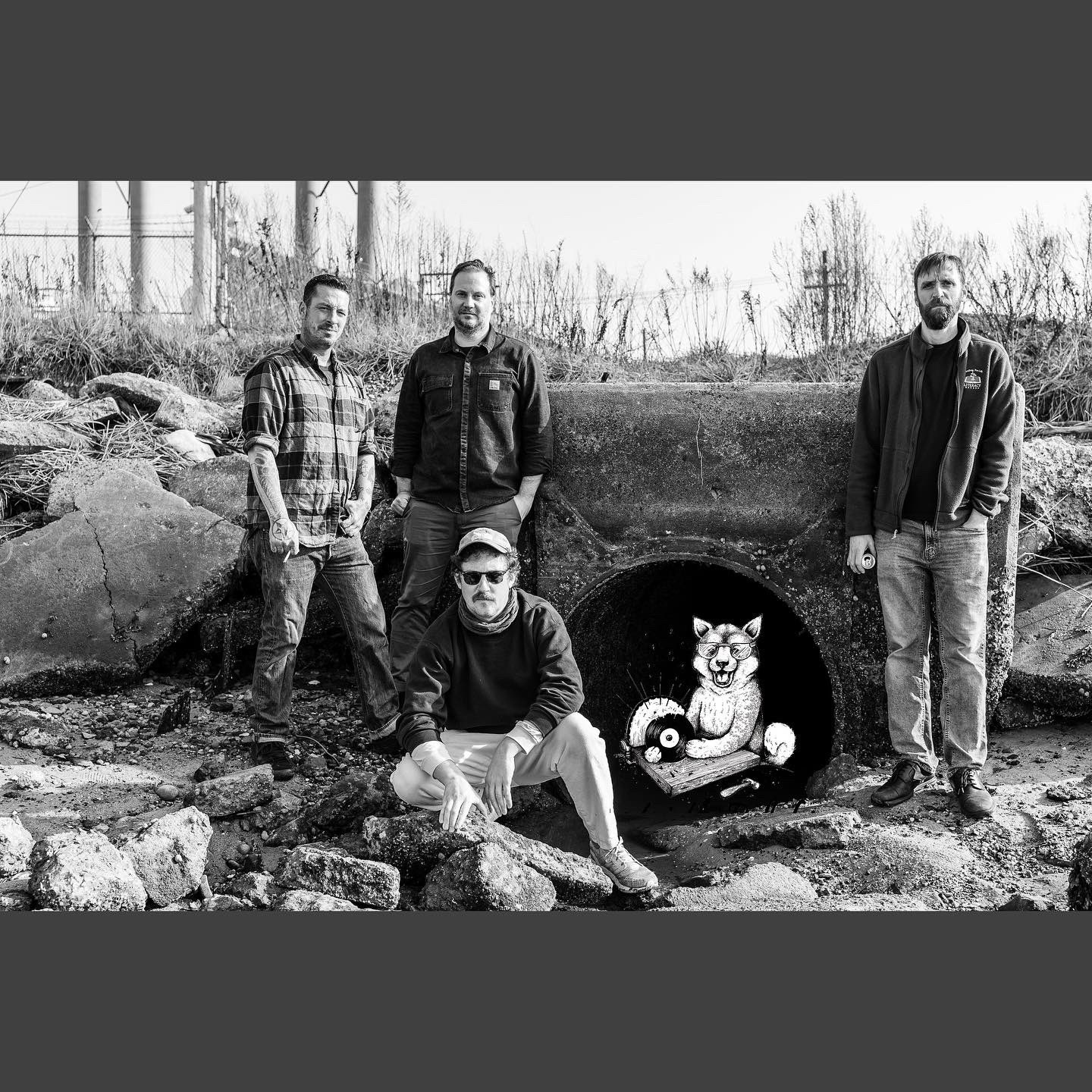 20 Nov 2022 - Thorsten
20 Nov 2022 - Thorsten
What a year it has been for modern Hardcore. There were some really amazing newcomers like Sunflo’er or The Callous Daoboys. We had some good or even mindblowing comebacks like The Mars Volta, City of Caterpillar or Gospel. (you can find out for yourself, which is the “good” one in that trilogy while the other two are mindblowing.) And that were just two ends of a year that also gave us records by Stray from the Path, Counterparts, STYG or Be Well. We are more than happy to have an interview with my favorite “Hardcore-Comebackers” of 2022 - Gospel!
Gospel is a phenom, they make highly complex music without sounding nerdy. They love “Prog Rock antiquity” (;-) and yet don’t come off as simple clones. True New Yorkers one doesn’t get that whiff of slight arrogance that sometimes comes with bands from the Big Apple. The guys have turned old but somehow still seem more than teenagers. All throughout this interview (which unfortunately also has one computer fail in the middle which you will notice, but cutting was not an option!) I had the feeling of talking to friends from way back in the day, with no real problem of picking up where we left. Friendly fellows who are more than happy to talk about their band, its history, their love for (early) Genesis and how they got back together to release the most amazing Progressive Hardcore record of 2022!
Continue reading > -
Interview with Sébastian von Landau (Wyatt E.)
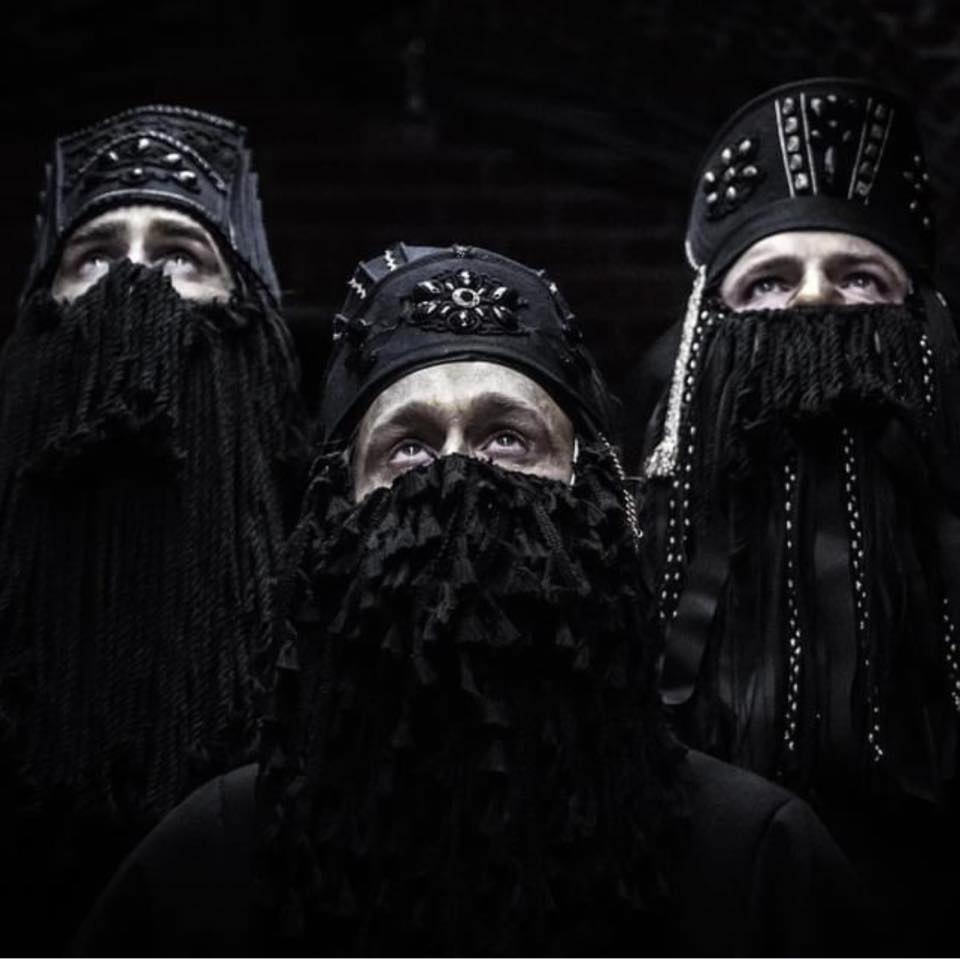 14 Nov 2022 - Thorsten
14 Nov 2022 - Thorsten
On a Thursday night in late April, which was quite chilly by then, three guys from three different countries (Finland, the USA and Germany) are standing outside a tent at Holland’s Roadburn Festival listening to a Belgian band play music that sounds like from the Middle East (Syria?) mixed with a bit of Jazz and lots of Psychedelic. The band? Wyatt E. The guys? Joe, Martin and me. The experience? Mind-blowing. Veil of Sound HAD to get an interview with the guys!
Even months after the release of āl bēlūti dārû (you can find our review here), the record gets spun here a lot, because the record is mesmerizing, enchanting and haunting - and all of that in a literal sense! We were very fortunate to sit down with Sébastien and talk about the concept behind the band, the prejudices of cultural appropriation the band has to face at times, his non-knowledge of Jazz and why he loves Roadburn Festival so much! Enjoy!
[Photo Credit: John Van de Mergel https://www.brothersinraw.com/]
Continue reading >

